#But that's like a whole tangential analysis sorry
Explore tagged Tumblr posts
Text
Yeah, this is my position too, basically.
Scott's definitely used children in battle in the past. No question. And the underlying conflict of Schism always made sense to me: of course the first of Xavier's child soldiers doesn't really comprehend the problem of sending children into battle in the first place.
But I think it's fair to point out that things were a lot different during the House of M/Decimation/Schism era. Mutants had been reduced in population to like literal hundreds, and the country was so hostile (and Dark Reign fully in place) that they had to retreat to an Island for their own protection.
It doesn't excuse what Scott did (particularly with Laura, but I can absolutely see why he did it - if you start parsing the characters, Laura and Scott are incredibly similar in terms of backstory and early trauma, and it makes perfect sense to me that Scott genuinely thought he was helping Laura by letting her use her abilities for a good cause and under the supervision of a trusted adult like Logan. Obviously it was the worst decision, but again, totally makes sense), but the context is kind of important.
Since then we've had the Schism, Scott's own fairly tremendous fall from grace after AvX, and Krakoa, when he actually got to spend time raising his actually-much-better-adjusted teenaged son and it's at least POSSIBLE that this provided some much needed context and clarity as to the maturity level and what you should expect from teenagers who weren't raised by terrifying mad scientists.
It's also possible that his argument is more about bringing UNTRAINED students on a mission like this. Which admittedly is more in keeping with his general characterization, overall.
It's hard to say without more interaction with younger mutants.
My own take on Idie is that she's probably supposed to be about 17-18. The rolling timeline is always hilarious and the general OFFICIAL position seems to perpetually try to fit everything in the span of twelve years. (I think Brevoort at some point stated Scott's intended age to be 28. Which is hilarious, but I go with it, because I enjoy breaking my brain to try to make this work.) In House of X/Powers of X, the timeline indicated that Genosha's destruction was about three years before (which is boggling, I laughed SO HARD), and the exact amount of time ON Krakoa is dubious too.
The Hellfire Gala MIGHT have been an annual thing. Or a seasonal thing. (I feel like they've mentioned both options at various times.) My guess is they'll end up going with "seasonal" on account of characters like Shogo still not hitting school age.
So yeah, my take would be Idie's about 17-18 and Quentin's probably about 19-20. With Jubilee and her generation at about 21-22, and Kitty at about 23.
I think you've got a lot of wiggle room though to call Scott a blatant hypocrite here, personally.
Apparently both characters have mind wiped their pasts entirely at this point. 😒
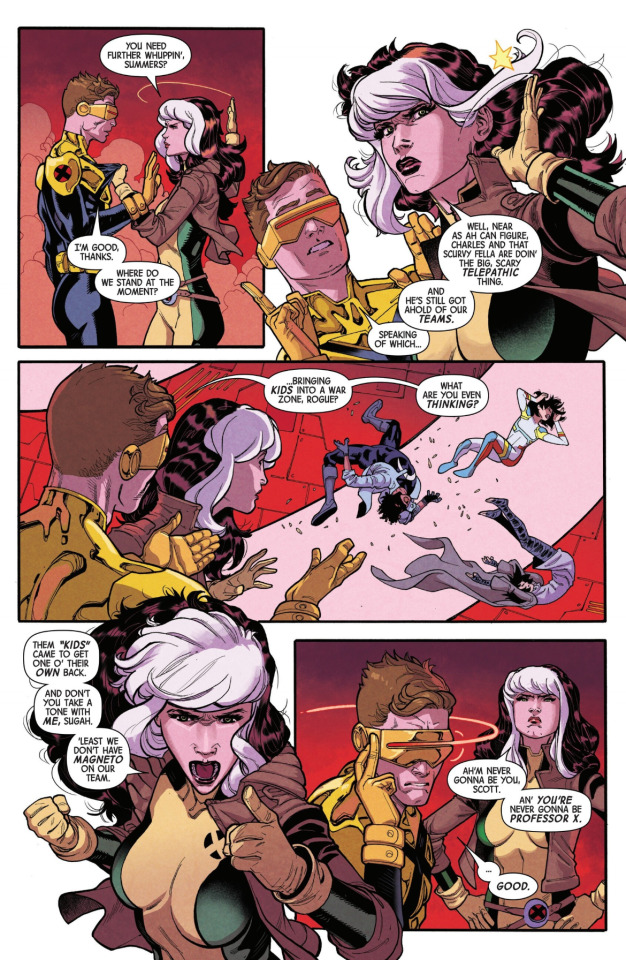
Scott had ZERO issue sending kids out to die during his “Rightclops era” and Rogue slept with Magneto for years…
#scott summers#cyclops#some timeline fuckery#I've long believed Laura is far more like Scott than she ever was like Logan#Even during that triangle with Surge and Hellion that folks treated as the second coming of Scott-Jean-Logan#But that's like a whole tangential analysis sorry
99 notes
·
View notes
Text
im very normal about fuuta in general but i dont think im ever going to emotionally recover from his fire motif and what it represents for his character and how he reflects the greater theme of justice so that means i must rant about it
(more under the cut because this got longer than i expected whoopsies)
so anyway fire is pretty obviously supposed to be symbolic of his passion for justice right? that fire is all over the place in bring it on. he's wielding it to take down enemies, his signature weapon is a flaming sword. it's what he uses to lead the campaign against the people he's after, the people he's deemed in the wrong.
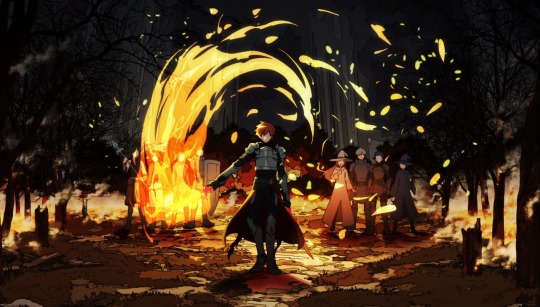
it's a fucking flaming sword, it's badass as hell!!!! it's what a hero of justice, a knight, would use!!!! it's cool as shit, it's his symbol of justice.
that's how he sees his justice in trial 1.
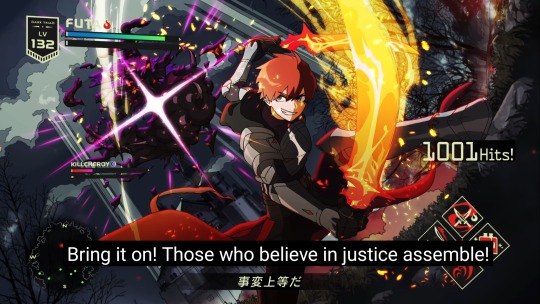
he's righteous, he wants so badly to believe he was a hero, he was doing it all for a good cause, for justice. his passion for justice was a tool he used to meet those ends, to be a hero, to wave it valiantly in the face of enemies.
the fire, however, is conspicuously absent once he's noticed the blood on his hands
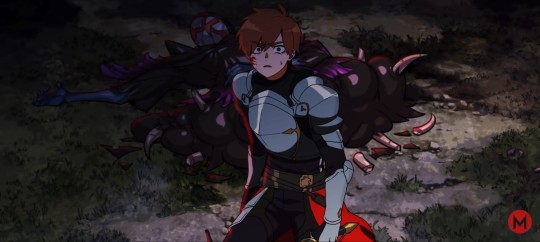
interestingly, despite backdraft as a song title being much more related to his fire motif than bring it on, fire is actually surprisingly absent from the mv's visuals. fire, as in actual orange burning fire, doesn't show up much at all in backdraft except for when both fuuta and his victim begin turning to ashes, and a short bit near the end right after the last chorus when the spraycan explodes in fuuta's face. you know what the mv does show a lot of though?
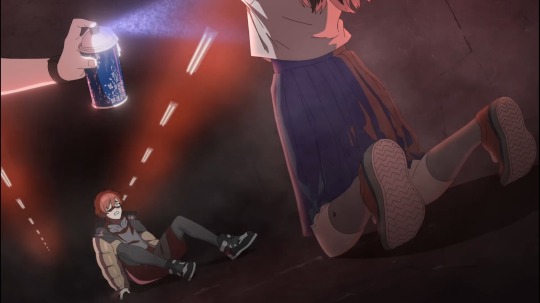
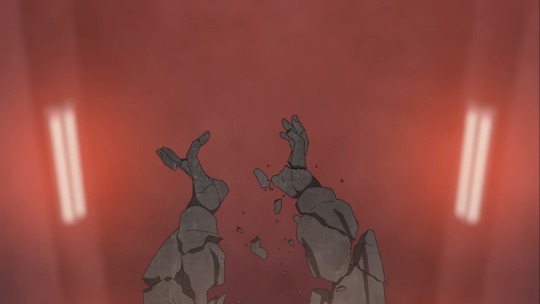
smoke. and ash. the byproducts of a fire, the byproducts of fuuta's passion for justice.
bringing it back to firefighting for a moment: as many people have already pointed out, backdraft as a firefighting term refers to when a fire that has consumed all available oxygen suddenly explodes when more oxygen is made available, such as when a window or door breaks. the thing about fire hazards, though, is if the fire and the heat don't do someone in, usually it's the smoke. the smoke inhalation causes breathing difficulties and suffocation, making it even more difficult for a person to escape the fire.
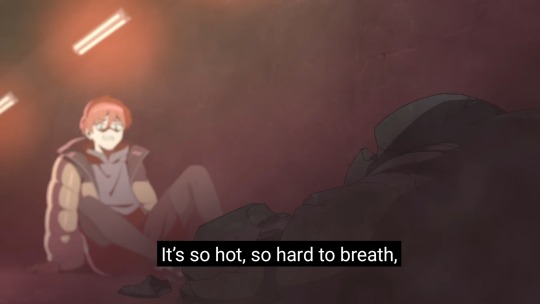
in backdraft, instead of fire itself, what we're shown is these byproducts of a fire. the smoke is damaging to human health, and the ash shows that the fire has burned things up and caused destruction, in this case killing someone. all we're shown is the negative results of a fire, in sharp contrast to its badass, positive portrayal in bring it on.
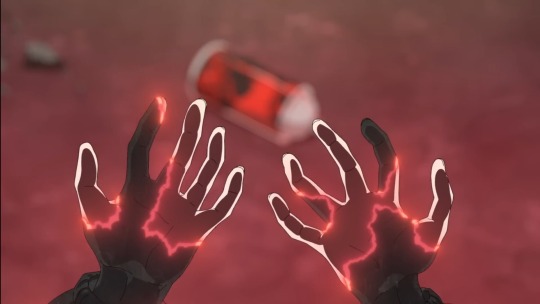
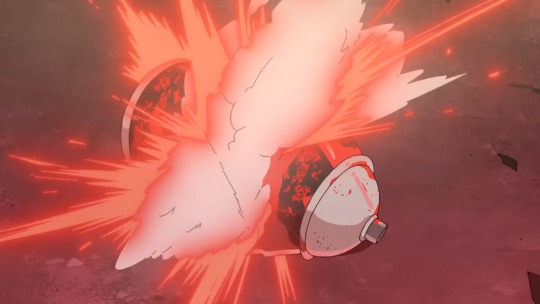
hell, even fuuta himself starts turning to ashes and the spraycan explodes in his face, showing how even he is experiencing the negative results of a fire that has gotten out of his control, how even he has gotten burned by his passion for justice. or, is it es' desire for justice?
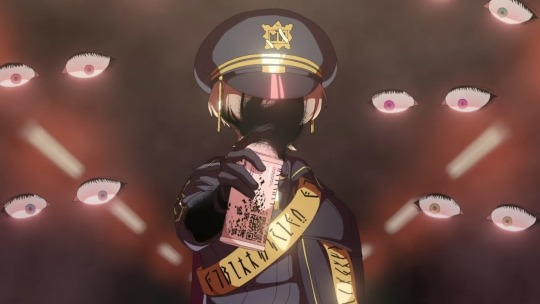
translation of fuuta's t2 vd by onigiriico
Me, too! I was like that, too! I also didn't think it'd turn out that way!
You and I are exactly the same breed! The only difference between us is the clothes we're wearing.
fuuta's justice and es' justice, it's all the same in his head now, he directly tells es that they're the same, that we're the same. it's all the same hunger for justice that ends up causing harm even if that wasn't the intention.
you know that saying that fire is a good servant but a bad master? i think that's pretty applicable to fuuta's situation. his passion for the pursuit of justice was great when it was still a tool, a sword he could wield, after all he did manage to shed light on some people's wrongs and bring them to justice. but once it exploded, when it became a backdraft that even he could no longer control, it did more damage than he intended.
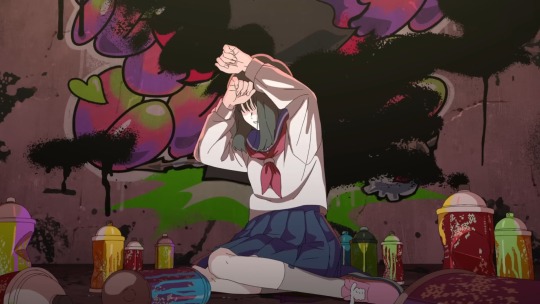
it burned even him, it killed a middle schooler. and he recognizes that in backdraft. he only shows us the ways fire that becomes a hazard can go wrong.
translation of fuuta's t2 vd by onigiriico
What did I do? All I did was say that what's wrong is wrong! I was just going off at a bad person online!
I didn't think they would die! I just thought that wrong things are wrong, and that a crime is a crime! You get that, don't you? See? Aren't we the same?
it's just. fire is such a good metaphor for the message of fuuta's character and his arc. it's an amazing illustration of how dangerous it is when you feed a desire for justice too much, when you forget to put a boundary on how you handle that fire. eventually the fire spreads just like how passion for justice becomes zealotry, until more and more things fall under what you consider to be 'punishable' by your standards and goes out of control to hurt people that probably didn't deserve it. it's a warning to set proper boundaries on our own definition and desire for justice and what's 'right' so the good intentions doesn't spiral into harm. it's a reflection of our attitudes towards milgram as the audience responsible for their justice and forgiveness. it's amazing i love it i love fuuta's fire symbolism i love fuuta's character arc and i love milgram's writing so so so much
#milgram#fuuta kajiyama#im sure someone has already gone through every point in this post before but i was having fuuta thoughts and they needed to go somewhere#this might be super disorganized this is essentially the first draft and i kinda just word vomited lol#anyways i love milgram i love picking it apart for its themes#tangentially i might do another whole thing comparing fuuta to kotoko but hm not sure if i can add much to that discussion#maybe after deep cover comes out#i actually really like kotoko for similar reasons to fuuta actually she's an interesting case study of a desire for justice that corrupts#anyways sorry this wasnt that deep an analysis or anything i mean i didnt even pull up images it's a glorified rant more than anything lol#hm might edit this post to add images tomorrow ill see if i remember
101 notes
·
View notes
Text
An analysis of WKTD and HWBM in relation to psychology, Christianity, and oppression.


Spoilers for almost all of We Know The Devil and parts of Heaven Will Be Mine (only stuff from when you play as Saturn tho that’s the only character I’ve played as so far)
This post is very much off the cuff so it is quite messy but I really needed to put my thoughts into words, I guess. Hopefully it makes sense, and sorry if there’s any errors!
vvv Analysis under the cut because this post is LONG vvv
Okay because when WKTD said “the devil is the shadow of man cast from the light of god” and when HWBM said that the Existential Threat was just a byproduct of the shadow of humanity cast from gravity (via humanity’s Culture) its like the enemy that humans want to fight is just themselves. The concept of the “shadow self” (also called the id, but I’ll be using shadow instead) in psychology refers to the parts of oneself that does not fully fit in with what society expects of them (Super-ego) and sometimes separately from the true self (Ego), typically leading to rejection of those aspects and self-conflict.
Now, please note that I haven’t 100%’d HWBM but I have 100%’d WKTD, and in that game the true ending results in the main trio all becoming devils and embracing those sides of themselves they’ve been running from for the entire game. The thing I quoted earlier is an actual line from the game said by god, the line following it being “the meaning of this phrase is that there is no devil.” Only through self-acceptance and helping each other alongside ourselves do we really reach the true ending to these stores.
While WKTD leans more towards individuals, HWBM puts more emphasis on the idea of the collective shadow; the story still focuses on individuals, yes, but is very much about the conflict between a humanity that is tearing itself apart over the things that don’t fit the collective image. The main conflicts of the story focuses a lot on that general unrest, and was initially the Existential Threat, but after that dissipated humanity still saw its own shadow, this time in itself. An email you can find in the game even says that “In abandoning Existential Threats to address the threats of our home, it will inevitably result in us turning to conflict between humans one more. And in turn, the Existential Threat will thrive.” The Existential Threat literally feeds on unrest and trauma, manifesting as paranoia and leading humanity to fight it, only for them to find that they were just fighting their own literal shadow.
It’s also important to note that HWBM briefly mentions that the Existential Threat is tangentially related to “their cousins on Earth, and even those are so weak kids with radios can take them out”. This, while it can easily be seen as a nod to WKTD for those who played it, the fact that the reference is super blatant (along with the mention of the Scout programs, likely referring to groups like the Summer Scouts from WKTD) leads me to believe that these two stories exist in roughly the same universe (or at least their worlds do, maybe not the characters present in the stories themselves existing at the same time*). This is for a very specific reason, and it has to do with the themes both of these games are tackling, regarding acceptance of the self, both on an individual and societal level, symbolized by the apple.
Both games reference the apple when talking about the idea of becoming something new, sometimes even beyond humanity. It’s about the embracing of the shadow and all the parts of yourself, seeing yourself as a whole being and accepting all of it. The joy and contentment brought upon yourself by finally letting go of all that repression and division, even if the world around you is going to perceive those parts as scary or ugly. Bad endings in these games are brought about by rejection of the self, which makes sense considering all the themes around queerness and transcending one’s humanity, so obviously and fittingly the true endings focus on healing oneself by accepting all of their aspects as part of the greater whole.
The apple in these stories, especially noticeable in its original thematic incarnation in WKTD, is in reference to the fruit from the Tree of the Knowledge of Good and Evil in the Garden of Eden from the Bible. Man was forbidden from eating the fruit, but Eve (VERY important to note that the dev studio is named Worst Girls Games btw) is tempted by the serpent (was not originally the devil, but came to be in the New Testament) to eat the fruit, which they do and become aware of themselves. God banishes them from the garden for breaking this rule he set out for them, also punishing the snake in the process due to how it tempted Adam and Eve. This incident is referred to as the “original sin.”
What is interesting about this part of the Bible though is what God says at the end of Genesis 3, right before the banishment actually occurs: “And the Lord God said, ‘The man has now become like one of us, knowing good and evil. He must not be allowed to reach out his hand and take also from the tree of life and eat, and live forever.’” The specific wording of “become like one of us” in the context of the apple metaphors from the games from Worst Girls Games is super intriguing to me, mostly due to how the idea of becoming something new is super common throughout these stories—becoming the devil in WKTD, and becoming one’s Ship-Self in HWBM.
There’s also the framing of the serpent in these stories, as well. The serpent in modern Christianity is almost always depicted as the devil, tempting humanity away from God throughout almost the entire scripture. In the book of Revelation, the devil is said to have gone to direct war against God and fighting against his angels; “Then war broke out in heaven. Michael and his angels fought against the dragon, and the dragon and his angels fight back. But he was not strong enough, and they lost their place in heaven. The great dragon was hurled down—that ancient serpent called the devil, or Satan, who leads the whole world astray. He was hurled to the earth, and his angels with him.” These verses can easily be seen in parallel to WKTD, with how the devil forms are said to be unstable and her world more fickle than god’s, and how in HWBM the Ship-Selves are delicately maintained by the Lunar Gravity Well.
But here’s the thing: the framing of the devil in these stories puts it in the position of being correct, with humanity making the right choice to follow it. This may sound strange, almost like villain behavior, until you remember these games deal with themes regarding repression of the self under an oppressive society, which is why these societies tend to be characterized by Evangelical conservative Christianity. Under this lens, alongside the themes of queerness and transcending humanity (rising to the throne of god, in a way), everything begins to click into place. The idea of being forced to live a certain way by a society that hates parts of your very being is killing our main characters, and they want a way out. The personification of the Collective Unconscious (ex: the devil) gives them this out—even if it’s less concrete and stable than the known world (the light), the unknown world (the darkness) is what truly gives our characters the freedom they desire.
They cannot do this alone, however, as we see in the Bible further into the book of Revelation, when the devil is aided by a beast from the sea and a beast from the earth, all three of them holding one another up and emphasizing one another’s’ powers and authorities. This, of course, most likely is reflected in the games in the main trios we play as. While I am still unsure about specifics, I trust you guys enough to understand what I’m getting at here, even if my speculations are likely flimsy at best. Either way, the idea gets across—the true endings for the games can only be obtained if everyone supports one another properly.
The scripture states that the devil does not have long on earth to do what he wishes (“… [The devil] is filled with fury, because he knows that his time is short.”), but that doesn’t stop him from trying at all. When it comes to the games, in WKTD the main trio stay in the cabin only for the night (player choices start at 7pm and the final one is at 1am, 2am onward being the ending you got, so choices go on for 6-7 in-universe hours), and in HWBM they have eight days to get back to earth before humanity declares them to be a threat. In both stories, our protagonists are all under strict time limits to do what they can in order to get the outcome they desire. As it’s said in WKTD, “the devil only ever gets one chance.”
Even though in the Bible the devil is ultimately defeated, in these games it’s the opposite. This is less about the theology they draw from and more having to do with undoing oppressive power structures through solidarity and community support while doing what you can to avoid infighting. Systems of hate and oppression are easily undone, which is why they put in so much work to scare you away from even trying to undo it and make you fall in line; resistance scares oppressors. Of course, resisting is not an easy task, but that’s just part of the work—they don’t call it a fight for no reason, after all.
Accepting all aspects of yourself and embracing that is the first small, yet very important step, to rejecting oppressive systems as a whole, and when society as a whole accepts what the system rejects, that system will inevitably fall, freeing those who are under it. Even though the world that comes after may be more uncertain and unstable that the last one, we still have each other to rely on and a foundation to build something greater and healthier than before.
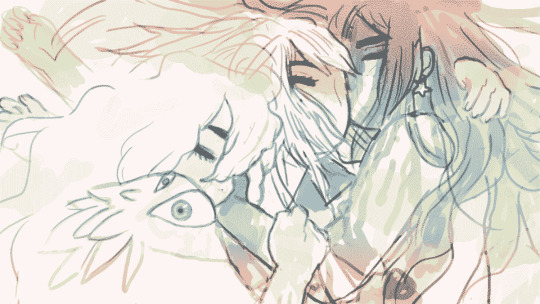
So, roughly and basically…
Super-ego = God = Culture
Ego = Humanity (consistent throughout both games)
Projection = Light = Gravity
Resistance = Radio = Ship-Self
Shadow (personified by Collective Unconscious) = The Devil = Existential Threat
Acceptance (of the Shadow) = Apple (consistent throughout both games), characterized by devil possession forms and Ship-Selves (Ship-Selves are dual natured like that, I think)
… Or something like that. I dunno, I’m not a psychologist.
Once again, I have seen all of WKTD, so I can say these things concretely about that story. However, I have not seen all of HWBM, so it more so feels like I’m making guesses as to what happens in that one, so just bear with me. I’ll be super hype if I’m correct in my theory/analysis.
*On this note, it is very amusing to me to imagine the WKTD trio as space mech pilots. The idea of the main cast of HWBM having to deal with devil possessions is also very fun :3
Sources for information + screenshots I’m referencing
Wikipedia: Shadow (psychology) (links throughout the article lead to other things I’ve mentioned like the Collective Unconscious)
Bible Gateway: Genesis 3, Revelation 12, Revelation 13 (New International Version)
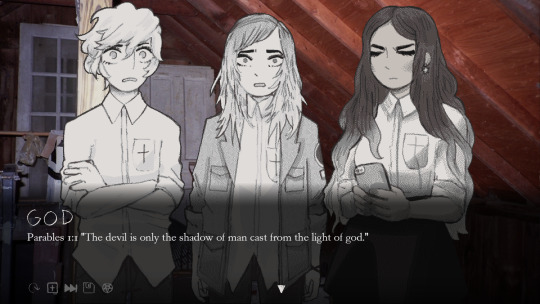
(from WKTD) (not my screenshot, stole this from my friend) (hi Ash <3) (platonic)
(I don’t have a screenshot of the line that comes afterwards or the line talking about the metaphorical apple in the epilogue of the true ending but I know they’re there. I have it in my brain. I’m too lazy to get a picture of it just trust me I know what I’m talking about trust)
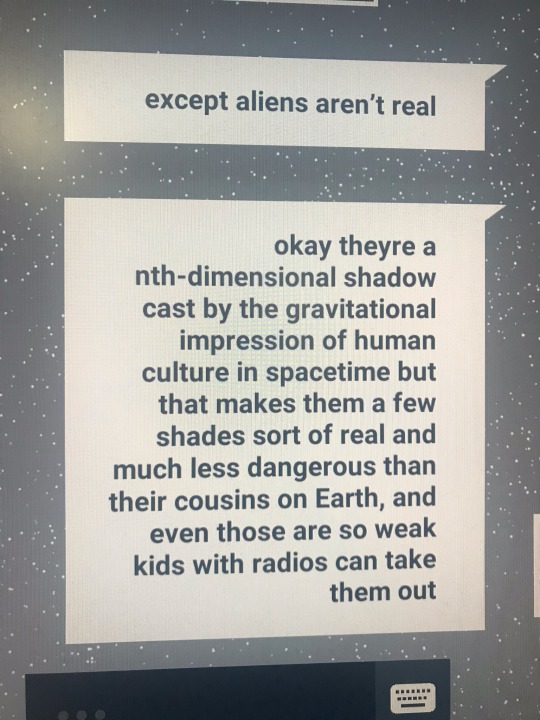
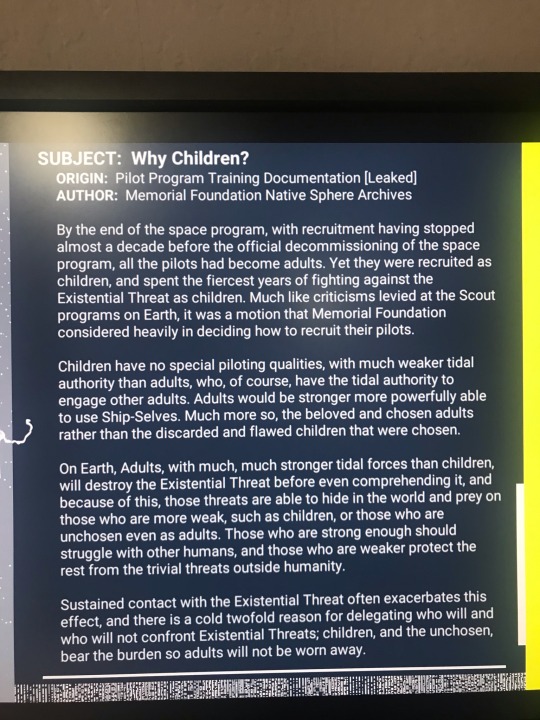
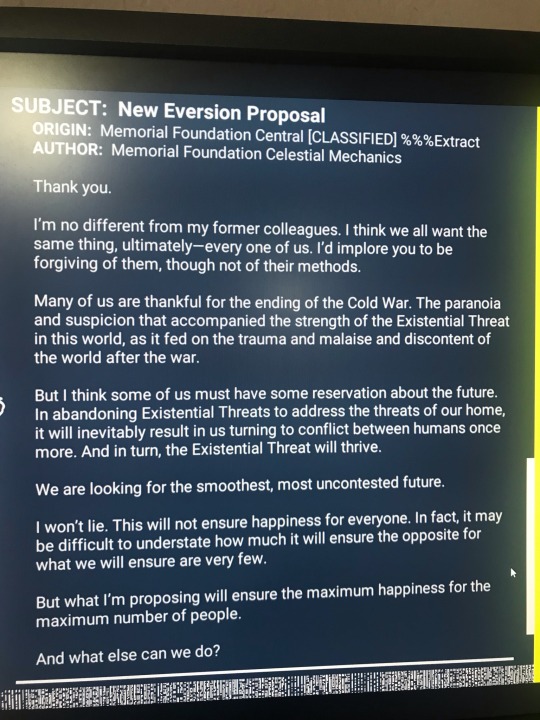
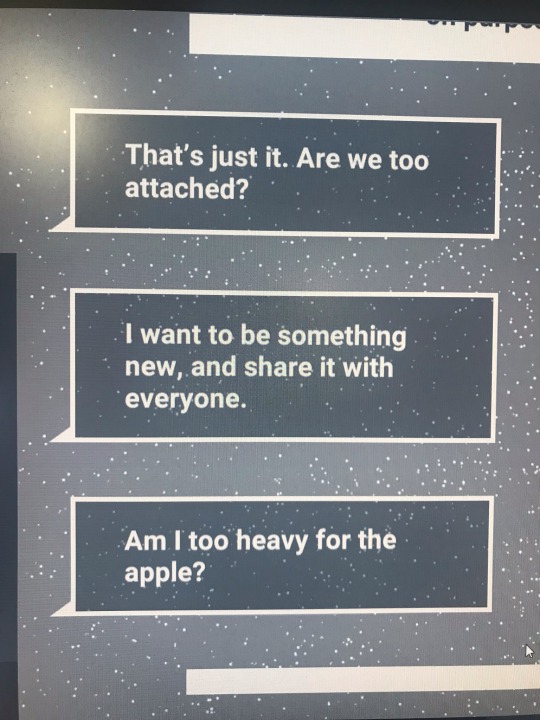
(from HWBM) (screenshots taken by me)
(I don’t have absolutely everything either just work with me here sorry)
#rambles#hwbm#wktd#analysis#sorry guys I had a category 10 autism event and needed to get this out of my system#we know the devil#heaven will be mine
132 notes
·
View notes
Note
ok so my sexuality-based analysis of Jennifer's body effectively boils down to Jennifer controls all sex and sexuality that she is even tangentially around, which, prior to The Event, I believe can be interpreted as both genuine sexual desire but also a wish to grow up quickly, be taken seriously, and/or gain power. Post-Event, it's quite obviously a reclamation of autonomy and control, although it also does leave room for her own desire (see: kissing Needy)
Needy's sexuality, on the other hand, is almost entirely under Jennifer's control or influence. In the instances where she attempts/has sex with Chip, Jennifer's presence interferes and the encounter ends with Needy leaving for Jennifer. Same thing with most of the kisses. Hell, Jennifer dictates how much of Needy's body she can show.
(I am So sorry, i don't remember who holds whose hand first in the bar scene, but if I did I would put that in here)
And the kiss between them, Jennifer wants it so she takes it, and once Jennifer's given her the okay, Needy is in the clear to kiss her back? Cause otherwise, she would have just continued to keep it bottled up, as usual. Because maybe she can kiss Chip on her own, but not Jennifer. that has to be given, not taken.
I'm sure none of this is new analysis or anything but it just leapt out at me so obviously with the first watch. Teenage girlhood and overreaching and smothering and the cooler friend whose consent you need for everything and her manicured fingers reach into every corner of your life. Trying to learn who you are. Coming out the other end with some of her fucked-up self in you, because there's no getting out of that unscathed.
And, on Jennifer's end (which I'll admit I understand less but I want to give her her due as well), feeling so horribly out of control, eaten up from the inside that you have to stake down every loose thing around you cause you just do. cause you'll be damned if you let yourself get burned that bad a second time, plus it feels good to be the center of someone's world. Getting away from yourself. Not caring enough to stop. Needing to be Stopped, and even then there's a vengeful shadow that keeps going long after you're through.
THIS MOVIE I UNDERSTAND YOUR OBSESSION
(also I'm sorry if my analysis is bad I'm not very good at media, this is just my vibes. also I was tired when I watched it so I might not remember everything perfectly)
you're so right and you should say it!!! like this movie is so rich in nutrients, there's so much to take in. like there's something about your best friend when you're in high school, there's something there where, yeah you have a romantic relationship, but nothing is as strong or as meaningful as the obsession you have with your best friend. in the script, needy says "i've always been able to feel what she feels, just not like this," and i think that's such a perfect encapsulation of what it's like, you've been attached at the hip for so long that you're vulnerable to the sensations of being the same person, and the pain of severing that bond in order to become your own person because as long as you remain together, you're under threat of being swallowed whole, completely devoured, overtaken, and the rotten gore of having to rip yourself away from them.
there's a possessiveness in jennifer that's so relatable in its specific type of toxicity, the desperate grasping attempt to hold onto the one person in her life that makes her feel not only understood, but in control. to the point that she would literally slaughter those around her to keep her dependent on her, no more colin, no more chip, only jennifer. it's the way girls are put in competition with one another, it's that desirability is threatening, sexuality is threatening, a girl in control of her own body is threatening, how terrifying it is to be in competition with the person you love the most, how terrifying it is to be the singular object of her affection. you've always been dazzled by her, you've always loved her, and that terrifies you more than anything once you realize she hasn't "changed," she's always been like this, she's always kept you close because you make her feel in control, superior, powerful, she wants to be your everything because it means she'll never be left alone, she wants to be your everything because you make her feel like she's everything.
like this movie is literally so genius because it speaks to that type of relationship so strongly, the mortal obsession with your best friend, the way you two would tear each other apart, the way you two would blur the lines of that relationship because nothing feels more potent than this, than you two, in your room, stuck together with all the pain you've dealt upon one another, the way you two would blur the lines of each other, becoming one another, the taking the taking the taking, give me everything you have to give, be my everything and let me be yours. it's layers upon layers of teenage girldom and teenage girl politics and the way teenage girls love like they could tear the whole world apart. boys are just morsels, but you, you're everything to me.
28 notes
·
View notes
Text
ok so. i feel like the term "video essay" has become very diluted. what people are calling "video essays" nowadays are just commentary videos. and the creators of the videos themselves are doing this, which annoys me because dude. youre making a 18 minute long video about like. "haha people on tiktok are soooo crazy look at them fight over stanley cups" and then have maybe like. a whole 3 minutes total of actual substance and the rest of the video is just pointless rambling about tangentially related opinions or basic surface level takes. THATS A COMMENTARY VIDEO !!!!!!!! JUST CALL IT A COMMENTARY VIDEO FOR THE LOVE OF. my sanity mostly
personally. what i consider a video essay is like. something along the lines of hbomberguy or philosophy tube. something with a clear topic, a thesis if you will, and supporting points with examples/proof and analysis explaining how those examples support the points and thesis. it doesnt have to be super structured and serious like a proper academic essay, but its clear that those videos are well thought out and edited so only the best parts make it into the final script. theres a reason channels like those only upload once every couple of months!! the quality clearly shows that they put a lot of time and effort into researching the topic and making an enjoyable video!!! so when commentary videos call themselves "video essays", i get really annoyed. hate to break it to you but your recap of the tiktok trend of the week is NOT an essay sorry
p.s. dont get me wrong i can totally understand/see the appeal of commentary videos. theyre lighthearted and about inconsequential stuff and you can just put one on for some background noise and thats totally cool! im just particular about how you label/classify stuff hfdjfdsh
4 notes
·
View notes
Text
My understanding is they’re not actually insurrectionists, that’s just what PFL uses as a “kill these guys for the force of good” dogwhistle, because, I think, “insurrectionist” is to the UNSC as “communist” is to US politics mid-twentieth-century.
I just take what (Carolina? I think? I can’t remember where these impressions came from sorry. I’m mostly quoting old fandom analysis from vague memory. It’s entirely possible I’m talking out of my ass) said about them being UNSC personnel who have been contracted out by Charon Industries in a dodgy-as-hell-if-you-take-the-law-at-face-value-but-actually-pretty-par-for-the-course military-private industrial partnership.
Charon Industries tells their personnel they’re fighting paramilitary rogue groups trying to steal the good-guy-Charon Industries’ projects and information which would be horribly destructive in the wrong hands, because Hargrove does not appreciate being stolen from, but reporting PFL to the UNSC for stealing shit Charon was not supposed to have would just be telling on himself. A select group of innies, through means unknown that have to do with CT, have realized this is… actually pretty true but not quite as straightforward it was represented to them. PFL tells its agents they are fighting insurrectionists who have a shady relationship with the shady Charon Industries, because the Director wants assets Charon Industries has. In reality, both PFL and Charon Industries are deeply tied with the UNSC (PFL being a UNSC project, Charon being private but with such heavy financial/industrial ties to the UNSC that Hargrove is able to weasel into the Oversight Committee and bend some laws about use of UNSC personnel for private interests to the breaking point). But both are breaking the fuck out of many big serious laws. Not just the torture within PFL, PFL’s absolutely buck-wild destruction of civilian zones and infrastructure, and everything Charon does on Chorus - those are trodden well in canon, but the implication is also there of PFL using whole-person flash-cloning (which is needed for the creation of a smart AI from a living person and involves destroying the flash clone’s brain. Probably several flash clones, because even Halsey didn’t get it right the first time), violating the Cole Protocol (okay I managed to find where I was getting a lot of this from go read Anne’s posts they make rvb make some actual sense e.g. https://anneapocalypse.tumblr.com/post/169326111451/tuckerfuckingdidit-izzybutt) and of both PFL and Charon Industries appropriating a war-prisoner huragok (and probably other covenant artifacts and prisoners, because I doubt it’s just one) that should not have been in private possession. As well, both are fundamentally pursuing the selfish goals of one Big Important Man far more than the interests of humanity in the Human-Covenant War, but they do enough for the war that they’re not looked at *too* hard and the extent of PFL’s crimes aren’t realized until after the end of the war and Charon Industries crimes aren’t recognized until after the battle of Chorus.
I just find it really fun to add another level of fucking absurdity to the Chairman and the Director’s passive-aggressive email warfare to know that they’re both just out here breaking every law like it’s the fucking purge while swinging their dick around at the other like I Am The Big Important Military Official Man You Hooligan Criminal. And both know at least some of what the other’s done on account of their slapfight over at least one thing neither should have, but they can’t *say* that’s the reason, because again, telling on themselves. So instead they’re in a race of covering up their own crimes versus trying to sniff out crimes of the other that they are not themselves implicated in. Hargrove wins, the Director is mostly past the point of giving a fuck by then.
anyways, this is all kind of tangential to the point of wondering what the personal motivations and innermost thoughts and values were of the core group of innies CT was collaborating with were. I want to know, too! I would be so into hearing people’s theories and fanworks on those. *chinhands*
Got to thinking about the Insurrectionists (Innies) from RvB. They need more to do cuz they exist for like...purely just cannon fodder for freelancers to kill with impunity?
And they're fucking Insurrectionists right? That means they should have a semi-cohesive belief system the helps us understand what their goal is with Insurrection? And like, yeah, Isle isn't/shouldn't just monologue the whole backstory and beliefs of the innies, but fuck we should know SOMETHING about what they believe!
Can you fucking IMAGINE? Imagine getting a cohesive ideology for an antagonistic faction. Literally in S13 if they gave Sharkface 1 line that addressed it further that'd be infinitely more helpful. Sharkface could've been Temple and we'd have had just as much idea what the innies goals were after season 13.
71 notes
·
View notes
Note
Omg… i saw your analysis on Saint’s acting in LBC and Why R U? And it made me think if you can also analyse Nanon’s acting in Bad Buddy (vs his previous works if you have seen them?). I really really love the way you analysed Saint’s acting and was hoping you could do one for Nanon… still upset i discovered the BL community on tumblr a little late tho… Your analysis is greatly appreciated 🙌🏻🖤
Oooo, okay so hi and welcome!!! The bit I wrote on Saint is here and I’ll reblog it now.
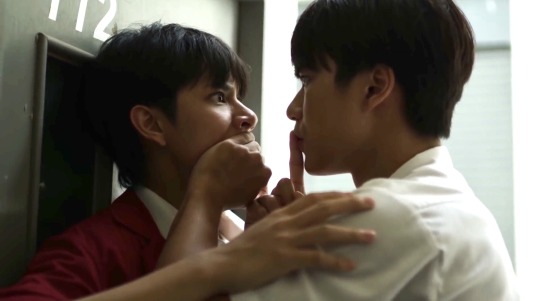
Why Nanon Korapat's Acting is FANTASTIC
So Nanon is legacy. His dad, Co Khunakorn, is a very well known Thai actor who has an absolutely MASSIVE back catalogue since the early 90s. (You can see him in BL tangential I'm Tee, Me Too as the absentee father who shows back up and then pretty much out-acts the entire cast of very well established GMMTV staples. Sorry all, he just does.)
Which is just to say Nanon clearly learned his craft at a very young age. And he is what I would call a professional grade craft actor.
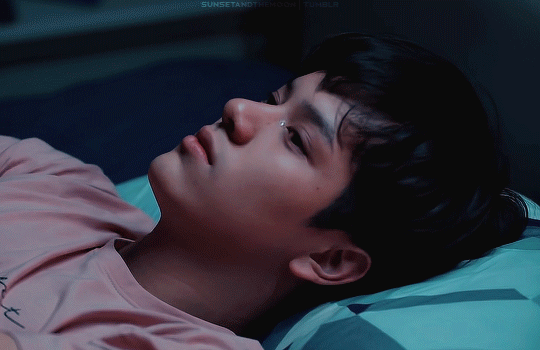
Nanon does a lot of his emoting with his eyes, slight tilts to his head, and judicious use of those all powerful dimples. In general, no matter what character, he has an innate softness and likability to his expressions that make him, even in interviews or on variety shows, very appealing as a screen presence.
He’s charismatic.
Also easy to cast as a the hero, because he can play good/decent human as not boring - which is a SKILL.
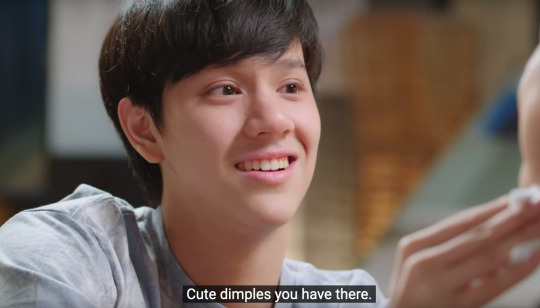
He inhabits his roles in a really specific and highly professional way - with less physicality than Saint (Nanon’s body language is pretty uniform), but more expressive nuance to his face. He’s quiet but concentrated about the space he inhabits on the screen.
A BL actor with a similar style to him is Taiwanese actor Sam Lin (We Best Love).
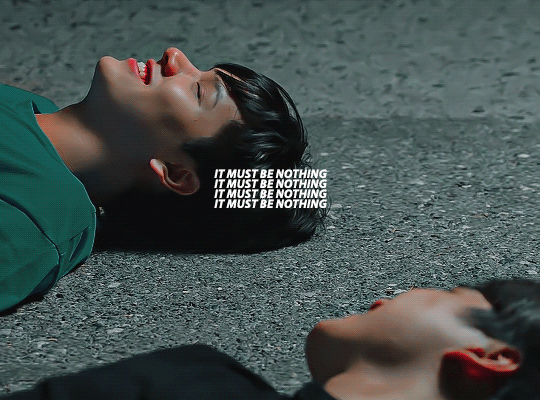
But I should say Nanon’s style contrasts nicely to someone like Ohm, who always inhabits a lot of space on a screen. Ohm uses big gestures and expressions, and his whole body when he acts, giving his characters a certainly boldness (even with a character like Dew). Which is not to say Ohm can’t be subtle just that he uses subtlety to quite a loud character, where as Nanon is the opposite. Nanon is mostly quite subtle and then occasionally outrageous for contrast. As actors they foil each other beautifully, and because they are good friends have great established emotional chemistry, and I think this makes for a deadly combination. This is what watchers of Bad Buddy are primarily responding too.
Also they are both VERY seasoned. Consummate professionals. A lot of BL uses green actors for one or both leads, we rarely get this level of pro paired together on a BL screen.
Back to Nanon.
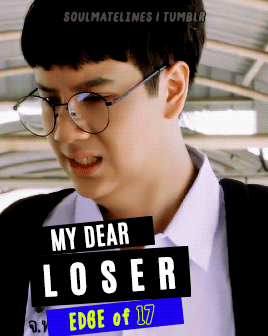
So a great way to take in his versatility and range is to watch some of his back catalogue. And since he’s been at GMMTV for a while now, most of it is on YouTube. I actually know him from his early lead role in My Dear Loser: Edge fo 17.
His character starts out as such a dorky loser (and being bullied) that I know a number of people on Tumblr struggle make it through this series. But he’s absolutely great in it. And while the series is a soft high school coming of age narrative it’s also a bit of a Pygmalion trope. He’s adopted by a biker gang and learns how to be cool and win the girl. So you get to watch Nanon act his way into a new identity through the course of the narrative. (Also it has a great enemies to lovers BL side couple of his bestie, played by Chimon, and Pluem AKA InSun. We’ll come back them.)
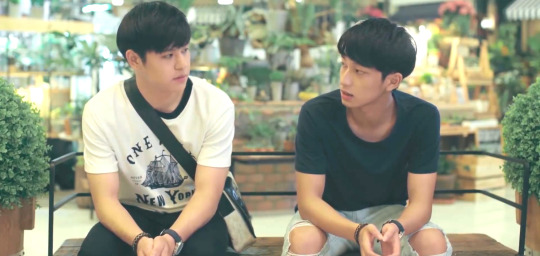
Something to know about Nanon that many other Thai BL actors universally fail at (especially the GMMTV stable) and which is another way he’s like Sam Lin, is that he’s not afraid to appear ugly or messy.
A lot of Thai actors (and Korean actors for that matter) are clearly invested in appearances (which is fine) but that colors their acting with a lot of self conscious reserve (which is not fine). This feels fake or disingenuous to watchers.
Nanon will get snotty and messy; he’ll fall apart and show a double chin; he gets all over raw on a screen. It GREAT. He entirely inhabits his roles and leaves his own ego outside of the studio.
When I say professional, that’s what I mean. He’s clearly not work for his directors. I bet he’s a joy on set.
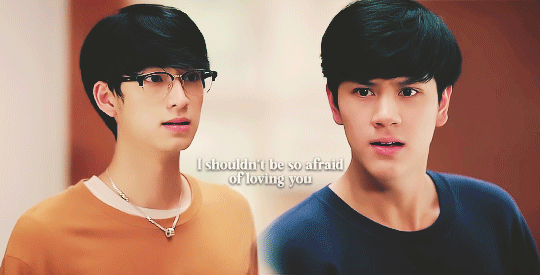
So, after watching his performance in MDL:Eo17 I’d go for The Gifted and/or Blacklist.
In both these shows, Nanon plays a slightly edgy but morally sound and driven outsider character. And in both of these he’s paired with Chimon in an enemy-to-bestie relationship. And yeah, both are bromancy enough to have feed some serious shipping. (I honestly have no idea if Chimon went out for the role of Pat or not, or if he doesn’t want to do BL anymore, or if he/GMMTV want to keep the PluemChimon pairing unsullied. I would love see PluemChimon anchor a show, and we all know Pluem would be game.)
Anyway, initially a lot of BL fans were disappointed in the casting of Bad Buddy because of NanonChimon hopes carried over from these two prior shows (and also Ohm has been historically undervalued). Now, clearly, everyone is on board.
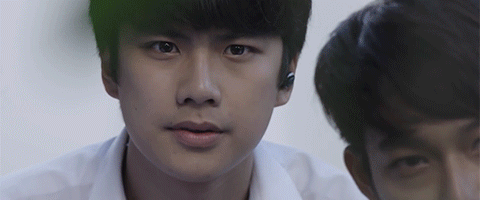
So you can watch Nanon mature as an actor through the course of Gifted/Blacklist/Gifted Graduation series, but that’s more to do with the roles he’s being given. Frankly, I think he’s pretty great out the gate in MDL:Eo17, these ones just show his range. Gifted is a better show, but Blacklist is shorter and Ohm is also in that one, so pick your poison. Nanon plays a very similar character in both, so you don’t really need to watch it all.
And there it is.
That was a very long answer to get at the fact that what Nanon has (that other actors don’t) is an innate charisma and a freedom from ego. I would argue that as a result he’s genuinely one of the best Thai actors of his generation.
We are incredibly lucky someone somehow persuaded him to do a BL.
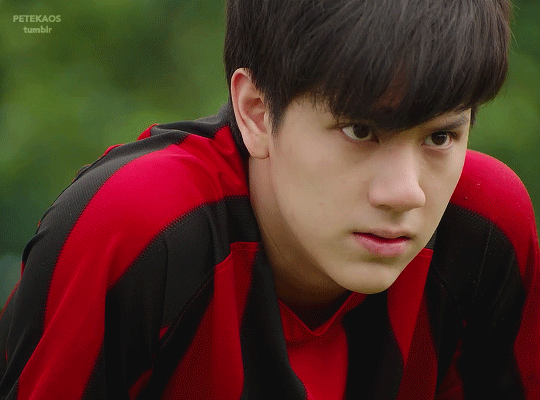
The kiss is going to be VERY interesting with these two.
* Note: Nanon & Ohm talk about their different acting styles (and acting as a couple) on this episode of Safe House 2, kindly translated by a fan. Apparently Nanon is v Method. (thanks to a kind commenter for the link)
(source)
562 notes
·
View notes
Note
Do you think that Laito inherently hates sex? Or somewhat is disgusted by the act itself and feel like shit afterwards?
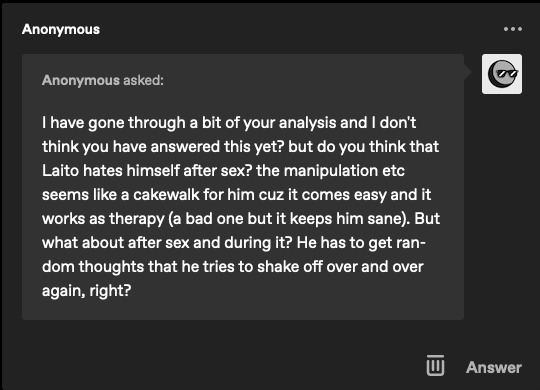
A very interesting thought indeed! I’ve been thinking more about this lately due to this being in my ask box for a little bit and also because of this analysis I recently wrote (also the format is super scuffed on desktop for this post for some reason?? Sorry about that for you desktop viewers).
More under the cut! [edit omg i forgot to add an under the cut asdlkfjsdlkfsjf im so sorry]
I think he sees sex as more of a means to an end and to proliferate his facade. I did write a bit about how he definitely utilizes sex to cope with his trauma, since he’s the one doing it in a controlled manner, but doesn’t realize the pain it’s inflicting on him. (that’s also why I don’t think it’s “therapy” necessarily cuz it’s definitely perpetuating his habits––but yes it does keep him “sane” because he’s just avoiding his emotions skadlfjsdf lmao u cant feel them when they don’t exist!” /j) I think that he doesn’t like sex with how he “does” it typically(/sexual activities).
When he has consensual (yay!) sex with Yui in MB, he has a completely different reaction compared to other sexual activities he does. This goes for Dark Fate too, he considers these sexual activities with more consent but is more like “hey hey! Can we do this? Can we do this?” (even though sometimes it is dubious––it seems that Yui has a genuine good time with it compared to MB and especially HDB from what I remember.)
I’m unsure about his thoughts during sex, since there’s no evidence backing it up. However, I can probably infer that deep deep down he’s hating it or thinking he could do something differently. I said something like that in this analysis that’s tangential to this:
...he would have perverted thoughts even with his facade “on”. In the earlier games he can’t differentiate what his true feelings are and what he wants to feel (aka his facade). However, to put it generally, some people who do have facades know they’re putting up a mask. For others, it’s subconscious. Maybe it’s a mixture of both, and it gets out of hand for others. It all depends on the situation! But Laito’s mental health state is kinda,,,, far gone, especially in HDB. I know that there’s a psychological extent of some trauma coping mechanisms where people will convince themselves to think that they don’t mind the trauma. In Laito’s case, he convinces himself that his traumatic events turn him on.
I would have to infer that he doesn’t know his true feelings deep down sometimes, because he gets so surprised/confused @ himself for crying at the end of his MB route. He was confused what tears truly were. So an extremely emotional situation, such as Yui taking her own life at the end of that route, brought his locked up feelings into the limelight. I don’t think that he’d be able to realize that he would hate sex if he’s been doing what he’s been doing the whole time. He usually needs something to take his mask off from the outside. I think he’s beyond “shaking off random thoughts” because he’s so far gone within his facade.
You can wear a mask enough so that eventually you believe that mask is truly yourself, when in fact it is not. This can be quite common for people who have gone through sexual abuse. Either they don’t realize their true feelings, or they realize it until it’s too late/they’ve made a grave mistake (or they get therapy! Which is great! Please get therapy no matter what you’re going through––but in this case, Laito doesn’t go to therapy >:( get this boy a therapist smh). He might feel like shit afterwards but doesn’t realize it/wants to ignore it, we don’t know, but there’s a lot of material where you can make inferences! I would say it’s in character for him if he truly does have that, especially if he’s forced to think about it.
Great question, anons! This was a pretty fun one to do, I love thinking about inferences I can make with him, especially these far to reach ones!!!
As always if you have questions/want clarification/have anything to add, etc, let me know!
Have a good one :)
#laito sakamaki#sakamaki laito#raito sakamaki#sakamaki raito#diabolik lovers#dialover#dialovers#diabolik lovers analysis#ask corn#analysis#dialover analysis#dialovers analysis#laito sakamaki analysis
99 notes
·
View notes
Note
I loved your "what is a story" post! Aside from structuring stories, are there any other things you think writers shifting from fanfic to original works tend to struggle with, or would do well to keep in mind?
Hey anon! I’m sorry this has taken me so long to reply, but it’s such a big question, it required a big answer. Especially, it’s a challenge to address because, as a creation medium, “fanfic” is far from a monolith. From a “how hard might a transition to writing original content be” standpoint, there’s a huge range - from people who write canon-compliant short stories coda stories that feel like they’re a living, breathing part of the source world, all the way through people who write epic million word AU stories about their own OCs who maybe at most tangentially interact with canon. Some people see writing fanfiction as “canon, the whole canon, and nothing but the canon,” while others see the original media as a jumping off point to play with other settings, tropes, archetypes, and story elements (“canon? I love canon! It makes a lovely whooshing sound as I fly on by…”). What a fanfiction author prefers to write, to some extent, influences what challenges they’ll face when they try to transition.
For those who specialize in “all canon,” their strengths will often lie in research, analysis, understanding metatextual themes, and finding holes or gaps to fill with new content. They’ll likely be weaker in world building and character creation.
For those who specialize in “what canon?”, their strengths will often lie in world building, character development, and recognizing tropes and archetypes and reapplying them to new settings. They’ll likely be weaker in analysis and recognizing plot holes.
These are obviously generalizations; an “all canon” author who does, for example, post-canon or uses OCs, might have lots of experience with world building or character creation. A “what canon?” author who, for example, writes historical works or field-specific ones (eg, a super detailed hospital AU) might be fantastic at research. And, further, hardly any author will be 100% one or the other; most writers will fall somewhere in between those extremes, writing some pieces that are canon, some that are AUs, some where they try to write the character IC-to-a-tee, some where they go “OOC is the new IC!”
Regardless of where a given writer falls on this scale (from “all canon, all the time” through “canon? what canon?”), the best two things any writer can do are: write more and read more. Especially, focus on reading (note this doesn’t have to mean literally “read a book,” it can be, “watch a show,” or “read a comic,” or “listen to a podfic”) original stories you enjoy, and engage with them “like a writer” (how to do that could stand to have a full post written about it, and doing so is on my list…). Look at how the author(s)/creator(s) use language, what the features of their world and characters are, how their plot is structured and paced, all the elements of the story. If it’s too much to take in at once, read multiple times and focus on one thing each time. You need to learn to recognize tropes and character traits, to see them and interpret them and understand that any given story is simply an assemblage of these features, and you can take the ones you like, discard the ones you don’t, and recombine them in infinite ways to tell any story you want. Take notes as you read - scrawl down tropes you recognize, character features that engage you, plot elements.
Having trouble? Try to tag the work like you’d tag an AO3 story, if you’re having trouble recognizing tropes and how to subvert them.
Would you tag it “angst with a happy ending?” “Emotional hurt/comfort?” “Mutual pining?” Congratulations, you’ve found tropes.
“Engineer!Character?” or “Character Needs to Learn to Use Their Words” or “Character is a Bad Parent” or “Asexual Character?” Congratulations, you’ve found character features, traits, and archetypes.
“Slow burn,” “getting together,” reunions,” “arranged marriage,” hey look, it’s a whole bunch of plot elements!
Learn to recognize tropes, and see how different creators use them and subvert them, will also help you see that when you write fanfiction you already do all the things necessary to create and write an original story.
It can help to take a step back and consider your own oeuvre. What kinds of works have you already done? Which pieces have you pushed yourself on? What do you feel your strength is? Write more. Read more. Read posts like this one - there are so, so, so many excellent writing resources on the internet. And, when you write your own work, experiment with different approaches - learn about yourself as a writer. What time of day do you work best? Does outlining help you? Do you need an alpha reader to help keep you motivated? Grow your experience by writing - any writing - and get a handle on what works best for you.
Still at a loss where to start? Read on…
*
Worldbuilding
Every world, whether it’s high fantasy, hardcore space opera, or modern contemporary, will require worldbuilding. Worldbuilding isn’t just the big, universal questions like: “how does the magic/science work, where are the cities located, how do people live?” Worldbuilding is also: “what does the corporation where they work look like, what is in the characters’ neighborhood, what are the places and things that will need to exist to make the story idea function?” You don’t need to treat this as “all the biggest stuff,” and I guarantee that, as a fanfiction writer, you’ve done worldbuilding - even if all you write is 1k coda fics. You may cut some corners, relying on context, on the “big stuff,” but the small stuff still needs to be in a story or it won’t make sense. What works in fanfiction, by and large, is the same as what works in original fiction. You should never be leading your reader through a lovingly crafted description of the surroundings/magic system/neighborhood/space ship while the plot languishes. You never need to have all the details up front.. If you’re a planner, go for it, plan the minutiae! But if you’re a plantser or panster, don’t feel you need to transform magically into a planner just to write original fic! You don’t. I’m a plantser. It’s fine.
You can often assume a reader will know what’s going on (even if they won’t!), especially if the character would know what’s going on. Weaving information into a story isn’t a “thing you don’t do in fanfic” - improving your writing in fanfiction will teach you how to do this as surely as writing original fic would. The writing itself isn’t different. Drop a reader in, and introduce them to elements as you go.
Introduce elements gradually, avoid info dumps, make sure the characters act like…this is just the world…they’re not going to (for example) explain things in detail if they’re eminently familiar with them. Use all the same tools you’d use when writing fanfic. Indeed, I think one of the biggest challenges a fanfic author will face isn’t “how do I worldbuild?” but rather, learning how to do consciously and intentionally something that they’ve surely been doing all along, because no story can be done without worldbuilding!
Thus, we circle back to “read your own work and the work of others and see what you’ve done and what others have done.” Force yourself to see that you do worldbuilding when you describe their surroundings, when you introduce story elements, when you say what they’re wearing. All the details that make your fanfiction rich and vibrant are worldbuilding. You build the world around the characters - whether they’re canon or OC - and then they interact with it to tell your story!
(Now, all that said, if you’re like, “that’s all well and good but how do I even start when I want to create a whole new world?” There are a lot of good articles on that; I’m personally partial to this list of questions by Patricia C. Wrede.)
*
Character Design
You create a character every time you write. Yes, if you’re creating fanfiction, that character already exists in some form, but you’re still creating: you’re deciding, in the context of your fanfic, what aspects of that character you want to explore, what behaviors of theirs you want to highlight, what things they do you’d rather ignore. You dictate their actions, decide how they’re established canon behavior applies to the unique and different circumstances you are exposing them to be. This is true even if the story is “all canon;” that said, the more AU a story is, the more likely the characters are to be essentially “original characters in a mask” - yeah, you might be using the names from canon, but when all is said and done what you actually are writing about is a new character, featuring the archetypes you chose from the base character and manipulated into a new environment. AUs change character ages, professions, surroundings, backstory, appearance, species, gender, sexuality, family, birthplace, native language, ethnicity, religion, intelligence, presentation type, I could go on…when you make them from Ancient Greece instead of modern America, when you decide they’re a half-octopus, when you say “oh, they’re ace,” when you go, “what if they were trans,” when you think, “I’m really in the mood for some pwp A/B/O…” you’re creating new character with aspects of the original character. The goal is often to keep them “enough like” the original character to be recognizable, but that doesn’t change that, in many AUs (and sometimes even in canon fics!), if the character names were swapped out with a find-and-replace, a reader coming in would be hard-pressed to recognize the source material. They might even guess the wrong ship (this sounds just like a Stucky story! they say, while you know it actually started as Destiel).
This is because characters are composed of archetypes and personality traits. They’re aggressive, they’re shy, they’re brave, they’re risk-averse, they’re selfish, they’re a martyr, there’s a huge menu of options, and any given character is rarely black or white…and when you decide how to portray a canon character in your fic, you’re automatically, often without thinking about it consciously, saying, “these are the archetypes and personality traits I want to focus on, these are the ones that’ll be paramount for this iteration of this character, the others won’t come up.”
So, much like worldbuilding, the concern you have when you transition to original fic shouldn’t be, “I’ve never had to make a character WHAT DO?” it should be, “I’ve been making and modifying characters all along, how do I bring myself to do intentionally what I’ve been doing anyway?”
I’ll give you one guess what the answer is, ha. Also, yet again, there are a lot of resources to help an author learn to do this “on purpose.” A Google Image Search for “character design writing sheet” turns up zillions of results, for example - look through, try a few, see what works for you, make some characters just for fun!
If you’re really struggling, try using one of those sheets to write up different “versions” of the same character you’ve written in multiple fanfics. Like, pick a canon fic you’ve written, and make a sheet for the main canon character, then pick an AU you’ve written, and make a sheet for that same canon character. You’ll notice pretty quickly that they each write up differently - they’ve got different goals, different motivations, different ways they react, even though they’re the “same” character. Pick the two “most different” versions you’ve written of that character, and compare, and it’ll start to be pretty clear: you’ve been making characters all along, so just…keep at it.
*
General Concept/Plot
“But what story should I tell?” can be a tough question to answer, especially for fanfiction authors who usually write shorter pieces, inserts, codas, and the like. The first thing to remember is…there’s no reason you should tell different kinds of stories! You can write a 2k fluffy meet cute between OCs. Not every original fic needs to be a 500k epic fantasy world saving adventure. There’s absolutely no reason you can’t write exactly the same kinds of stories. Yes, you’re not going to write a “fix it” or a coda for your OCs, but you can absolutely write “moment between” original pieces. You can write drabbles. You can write shorts, novellas, pwp, anything.
However, if you want something more involved…I think you’re starting to get the gist here but I’ll reiterate one last time…look at your source canon material and at the fanfiction you’ve been writing. What were the story elements you chose to incorporate when you made your transformative piece? What do you love about that source material that you’d like to emulate? Do you enjoy a good mystery? Do you like the agonizing drag of slow burn? Do you crave that “I COULD JUST SMACK THEM BOTH” of idiots to lovers? Do you want historical drama, political machinations, high adventure, space battles? Consider what story elements drew you to that fandom, what about it made you go, “THAT’S the one I want to write for!” Consider which story elements you most enjoy playing with when you write fanfiction. Then…do more of that. If you love a good plot twist, or an air of horror, or BDSM, or, or, or…that’s a good start for figuring out what story to tell.
It doesn’t have to be what you’ve written the most of, to be clear - but absolutely it should be something you love and want to emulate. If you don’t love it, what’s the point in writing it?
Figuring out what story you want to tell with OCs isn’t magically different than figuring out what story you want to tell for fanfiction. Your best bet, truly, is to go about things using exactly the same strategy you use for fanfiction. If it helps, you can even plot it using fic characters - pretend it’s an AU, figure out the story you’d tell with canon characters in that AU. If you’re playing with archetypes as discussed above (spoilers: you are), and you’ve put together a world for them to play in, creating a story to tell in an AU using “established” characters is exactly the same as writing original work, except you give them different names, and you don’t throw in random references to canon or quotes that insiders will get.
*
The biggest mistake most writers make when they transition from fanfiction writing to original fiction writing is treating original fiction as some ineffably Different And Unique And New form of writing. It’s not. A good original fic and a good fanfic will have many, many elements in common (YES, even if the fanfic is set in the canon verse!).
The best advice I can give, honestly?
Do exactly what you’d do when you sit down to conceptualize a new fanfic, but every time you hit up against “Oh I can’t have them say that, that’d be OOC,” or “Oh, I can’t make that happen, that technology/magic doesn’t exist in that world,” or “Oh, I’m going to have to change that, there’s no canon character that makes sense for a role like that,” you can go “OH WAIT THIS IS ORIGINAL I DO WHAT I WANT!” and you make that thing you want them to say be IC for them, you change the technology/magic/whatever so what you need exists, you create a character that’ll fit that role.
Fanfic or original fic, the story is always your sandbox.
Now - go build some castles!
*
Have a writing question? Feel free to drop us an ask on Tumblr.
Like what we do? You can support us by buying our books, checking out our merch, backing us on Patreon, or buying us a ko-fi!
87 notes
·
View notes
Note
You referenced being in school/working on your PhD (I think, might be misremembering sorry). When do you typically find the time to write? Im so impressed at your pace, dread futures is a behemoth
Hi! I'm gonna use this as an opportunity to rant about science PhDs because so many people don't know how they work 😅
But long story short, I walk to/from work every day and write on my phone during that time, and I try not to bring work home but have a lot of anxious energy so I end up needing Something To Do with the little free time I have, so I end up writing. I wasn't sleeping a lot. I also have a pretty fast typing speed, and used to transcribe interviews quite often so transcribing game dialogue is pretty quick for me too. And I was Really Feeling Things and had a story I had to tell. And I really cannot emphasize enough that for the most part I turn off my inner editor when I write fanfiction, I do not plan my stories out much ahead of time, and I treat it kind of like an improv/dnd-like experience. What got published last is what I have to work with, and I have to make it work. I also self impose a 3k goal/limit on my chapters and then it's time to publish. All those things combined yield a pretty fast update schedule.
Now for the rant:
Most people think of graduate school as just that--school. Having lived with PhD students in Classics, Chinese Lit, and Business, that's true for a lot of disciplines. You take classes. You read all the time. All the while you're forming Opinions and you explore those in lectures and articles you produce, using the vast amount of information you've absorbed over your schooling. If you're familiar with an Honors Thesis from undergraduate education, you basically produce one of those over your time in a NON science PhD program.
A STEM PhD is much, much more like an elementary science fair project, but instead of asking What Is The Most Efficient Design for a Solar Cookie Oven, you're asking questions that contribute to issues like climate change, chemical waste production in manufacturing, Alzheimer's treatments, and vaccine development.
Sometimes your adviser is the one who tells you, "Hey, study this and see what happens" just like your elementary school friend might have had a parent or teacher give them an idea. Sometimes you yourself come up with the idea. Either way, here's the real difference between a science fair project and a PhD project:
In a PhD, no one has ever asked the question you're asking, and no one knows the answer. And your Question might be so small and seemingly inconsequential, you will never be able to explain it truthfully to your grandmother over Thanksgiving dinner. Even if your Question is fundamentally important to something like the race to efficient carbon dioxide fixation.
Also, it's not fair to say you have One Question in your PhD. A PhD researcher is a one woman army against a whole battlefield of Questions, and you spend about 1 year per Question (Project) answering (and all the little side questions that come up, curiosities, flashes in the pan, that you think might help you answer the main Question). A typical chemistry thesis is about 3-6 big projects that are related to one another usually only tangentially.
Day to day life is NOTHING like being a student. I walk to work and get in ~8am, and leave at 6. I work 6-7 days a week. The whole time I am doing research work: either at a fume hood, or in a glovebox, doing chemistry, or MAYBE I will sit down and analyze my data or look up prior research in the field to inform my future experiments/learn how to do a certain analysis.
I am teaching myself new techniques, new chemistry, and producing new techniques and new chemistry.
Science PhDs come out of their programs and go into jobs and their bosses tell them to stop working so hard, to only do what they're told, to stop taking work home. Because in normal industry jobs you get contracts that include time off, regular work hours, and regular performance evaluations, whereas a PhDs job is never done, your hours are dictated by what the experiments require, and the amount of time you spend doing your work is pretty proportional to how long your degree is going to take. :-/
Oh yeah and if you're lucky, you have a contract with your university! If you're lucky, you have a union! But most of us have neither of those.
STEM PhDs fortunately will pay you, rather than you paying the University. However, better settle for 25-30k (US)/year. Maybe you get health care. Good luck if youre in a more expensive rent area because 30k is already pretty high for a program offer. Oh, and unless you're very lucky, you likely will need to be a teaching assistant for undergraduate courses multiple times a year. Some contracts stipulate that TAships cannot require more than 20 hrs of your time per week (that's a 50% appointment, and the rest of your time you're supposed to be working in your research lab) but good luck, most of the time your teaching/grading load is going to be ~30-40 hours of its own. And just because you're teaching doesn't mean you get to produce any less work for your research!
Because here's the other thing: you're not an employee, you're not a student. You're supposed to be doing research to answer Questions that will save the world. But you get paid, and your adviser/professor gets paid, and your SCIENCE gets paid, based off of how many Questions you've already answered and how Important someone in the government judges your Answered Questions to be. So if you're not Answering those Questions and simultaneously proving that your Questions are Important, then your funding, and your adviser's funding, are at risk.
I worked in a startup for a while and it was very similar in mentality: your life and your work are the livelihood of the company, and you have to do everything in your power to ensure the company is popular and productive, with as little funding and time off possible--because if you don't do the work, there's no people or money to pick up the slack.
The upside to working in a startup, though, is that in my PhD I come across fun questions like: hey, why is this *that* color? but this other thing is different? And I have the freedom to try and explore those questions. Whereas in a startup, there is no space or time to waste on side projects. I'm in to this work for the curiosity and the passion (when I have energy enough to remember them lol). And a PhD not only provides me with specific skills and knowledge, it also proves that I can pick up any new field and dive in, teach myself, and be productive in it. Most of us never go on to work in anything immediately relevant to our PhD work, because our PhD work is so open ended, but also so narrow in scope within a field. It's important work and it's how most progress gets made in our quality of life and technology and healthcare and other developments as a society--this brain-breaking labor of love by underpaid and over caffeinated, unprotected workers in labs that are constantly at risk of being defunded.
Oh and halfway through, after you've wasted 3 years of your life melting your brain with big Questions, you have a Candidacy Exam where you prove your worth to a committee of Expert Professor Researchers in your field, and they say whether you even get to finish or not. 🤗
Which is what was happening when I started writing DPDF. in the middle of a pandemic. With a lot of my friends and support systems leaving me. And DPDF was born as a coping mechanism for the hopeless, worthless, existentially threatening place I was in at the time. Nothing gets the fingers tapping more than feeling like you want to die every moment you're alone with your thoughts, and having every other moment eaten by blistering brain work. Not working, and sitting, and relaxing were impossible and made me feel extraordinarily guilty. So I wrote. Like my life depended on it. It did. It does.
54 notes
·
View notes
Note
Talk about all the Fillory worldbuilding in LQoF, please :)
THIS IS INEXCUSABLY LATE. I’m so sorry!
And I wish I could say it was just my scatterbrainedness, which is definitely a constant factor, but it was also that when you sent this, I was deeeeeeeep into writing the final few chapters of Little Quirks of Fate and I was kind of... in my head about it. It took a lot longer to finish than I had planned (a cardinal sin to my particular combo of severe ADHD and Type-A personality) and I was spending excessive amounts of time making sure I figured out a satisfying ending by my own exacting standards, so I just didn’t have the headspace to think through my early process yet. Very sorry about that :( But now that I’m finally done, I’m excited to look back! So if you’ll indulge me a very late answer, I’d be tickled. 💗
Long ramblings and major fic spoilers under the cut.
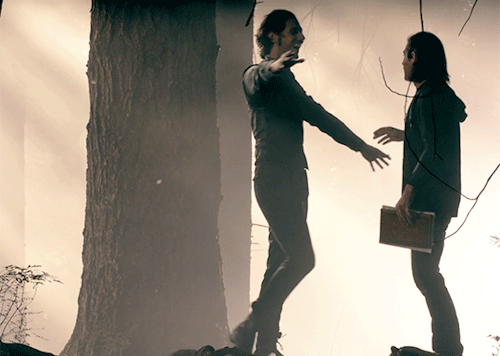
The truth is a lot the world building came down to character stuff foremost, followed closely by my preferences as a writer. I adapted the world to the story I wanted to tell, while using the little bits of information we’re given in canon as a baseline, rather than building the story around the world. And that was a lot more fulfilling for me, since I only really love worldbuilding through the lens of character, rather than as an exercise unto itself (though it’s super fun once you get rolling.)
To explain what I mean by that, you need to know that Little Quirks of Fate was originally going to be a oneshot. My plan was about 25-30k (lol) of a pure S2 retelling, only with Quentin in the role of Fen. It was also going to take a much more traditional enemies-to-lovers’ path—with Quentin as an active member of the FU Fighters—and the whole thing was going to be in his POV. Also, they weren’t even going to kiss until after the bank heist (which, yes, was going to be a thing here), but that got abandoned the fastest in favor of trying my hand at smut. But two things made me realize I needed to significantly shift course:

1) I was struggling to make Quentin actually feel like Quentin. I wrote this very atmospheric early scene at the FU Fighters encampment, with lots of description of the bonfires and the way their shirts dyed in Fillorian red looked like blood (you get it.) It took place in the black of night, shrouded in secrecy, and when Bayler questioned Quentin about his new husband, Quentin said something like, “He’s a drunk idiot, we have the advantage.” It was all very lush and dramatic, but it really, really, really didn’t feel like Q in any recognizable way to me. Now, I’m not someone who thinks Q needs to be a precious sweetheart all the time, but what I was writing didn’t have his idiosyncrasies or a motivation that felt true to who I feel he is.
2) The draft was DEFINITELY missing Eliot’s story and his perspective. I certainly don’t think Eliot’s POV is always necessary (sometimes not having his direct thoughts heightens tension in romance especially), but it felt really necessary here, to fill in the gaps of what Quentin was assuming and also—more importantly—because the events were just as impactful on him, but in a very different way. So I knew I was missing half the narrative, but that meant I would need to deal more explicitly with the Beast (i.e., Mike, the most devastating storyline to me, personally) and I really, really didn’t want to do that.

My first step in making a more recognizable Quentin was figuring out a way he could more or less use the same syntax that he does on the show. Voice is the first way I connect with a character, so while many writers in this fandom thrive at modifying speech patterns and keeping the heart of a character alive, keeping close to Quentin’s canon speech was an easy fix for me in a story I was excited to get rolling. Sort of like the old adage of uplifting your strengths before putting outsize energy into things you struggle with.
The easiest way I could think to give him the same syntax was to figure out a way Quentin spent some significant time on Earth during his formative years. And once I rewatched 2x06 and was reminded that Ess went to Phillips Exeter Academy for high school, I lost my damn mind. I started sketching out ways that Quentin could get there too and that’s how I built out the idea of Umber brokering a marriage deal with the actual landmass of Coldwater Cove, which included an education opportunity for the boys (in a nod to Fillory’s patriarchal nature), and also the reason why Umber did that, which was to take advantage of his brother’s orgy mistake with the first Children of Earth to usher in a more productive and orderly Fillory. So that created a whole new set of rules and essentially a whole new world for me to play with... all for the sake of Quentin getting to say “fuck.” It was that important to me. :p
And as I worked through all that, I realized I also wanted to give Q magic, since Quentin’s relationship with magic is something I’m interested in. But I had read on ye olde Tumblr that the reason Illario uses a wand in 2x06 is a nod to the books, where Fillorians specifically aren’t Magicians and that’s the rationale for the Children of Earth royalty. And while I generally see the books as interesting supplemental material with zero bearing on the television show canon, I still said to myself, “Self, wouldn’t it be kind of funny if Quentin was the only native born Fillorian who had magic and so the FU Fighters believe he’s the chosen true High King, but instead of it being because he’s ~special~, it’s because Umber made a clerical error? Lol! Hilarious!”
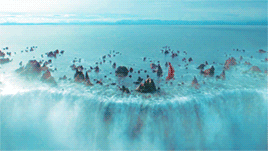
So while all my questions for how to explain all THAT spun out into more and more detail, at the same time...
I caved to the idea that this story was going to be a No Beast AU, just like my last two stories, mostly because I really couldn’t bring myself to deal with the Mike of it all, even tangentially. I could have just changed that single element, but I’m not a half-measure gal! But I still wanted to stick with the vague background theme of Fillory = adulthood from a questing perspective and I wanted Julia leading the charge this time, but without the sexual assault that occurs in canon. So obviously, the answer was avenging all of the murdered and cannibalized “grown-ups,” i.e., master Magicians, by seeking out help from the gods in a balanced Fillory free from the devastation of the Beast. Duh! ;)

So then, like anyone would do, I rewatched every episode up to 4x11 that makes a mention of Fillory and took about twenty pages of notes on the canon worldbuilding, along with an analysis of how much a particular piece of information would be impacted or not by balance in the realm. For instance, the existence of geraniums (per The Fillorian Candidate and Tick’s misunderstanding of “power plants”) and the lack of diamonds as a precious stone (per the River Watcher not knowing the value of Margo’s earrings in Knight of Crowns) struck me as static facts unaffected by Ember’s reign of chaos. But I shifted the overall feel of Fillory to one that’s more functional and a lot more bureaucratic, leaning on things like the existence of socialized health/vision/dental insurance (the idea of which is canonical, per a petition from the beavers requesting dental coverage from acting High King Josh in Ramifications), strict taxation plans, and an overall sense of thriving Ceremony to show Umber’s influence.
Basically, I wanted Eliot to inherit a much, much easier Fillory to rule—especially with the highly educated Quentin as a built-in and passionate advisor—mostly so it wouldn’t completely strain credulity when a lot of his energy goes toward his love life rather than the intricacies of ruling (though Margo would say he still favored his personal life more than he should have, and she wasn’t... wrong. He wants to be a husband more than a king!) But I specifically made it so most of the chaotic elements were played as whimsical (sorry) quirky shit or smaller hints of greater injustice (see: Ember getting rid of STDs, but still letting magic-poor citizens die of sepsis because that’s too boring to deal with), all while a cataclysmic danger lurked under the surface.
After that, I just filled in details as they worked with character stuff and plot stuff, and I tried to make sure they didn’t contradict each other in a way that couldn’t be chalked up to “chaos.” I basically lived with the Fillory map open all the time and also took screenshots of Benedict’s map of Loria, which gave me alternate ideas for the overall feel of the landmass rather than just the kingdom. And pretty much that’s the basic process I used to create the world! It was extremely fun, and I learned a lot, though I’m *definitely* focusing on some pure relationship kind of stuff for a while because... oof, sometimes it was a lot.
Annnnnnnd if you’re still with me, here’s some stray observations, for funsies:

I wanted Quentin and Eliot’s starting points to be more mature than in the show. Quentin when we’re introduced to him as an adult in LQoF is a lot more jaded and cautious than S1 Q, which is because in this world, his S1 mentality happened while he was on Earth and came to a head during the throes of his fucked up relationship with Bayler. Similarly, Eliot had already gone through a lot of shit too, and was much more self-actualized by the time he agreed to be High King here than in the show. It was still out of desperation for purpose, but not coming out of a direct trauma spiral. I think if they had been younger, both in age and mentality, the story wouldn’t have worked because they would’ve blown it up day two. They’re both still disasters, as we like to say, which is why the... everything happens, but they’re not disasters in the exact same way as in early canon. I thought of them as closer to their S3 selves, pre-Mosaic.
While I mostly kept Quentin’s syntax the same as on the show, I did change it up in some ways to reflect his Fillorian upbringing. The most obvious was replacing “goddamn” with “godsdamned” and “Jesus” with “Hades,” but I also made him slow on the Earth idiomatic uptake and slightly more likely to use passive voice and less likely to use contractions, especially early on and especially when speaking with Fen. He also said slightly out of date things even for someone who last remembered 1999, since Earth was still overwhelming despite his immersion. E.g.: In the epilogue, he asks Eliot if he can spend some time “Googling the World Wide Web” instead of watching Gossip Girl together, even though by 1999 most people were saying “on-line” or “the internet” by a pretty wide margin. But in my mind, the first term he learned was World Wide Web and he stuck to it like glue.
I originally had a full-blown coronation scene, where Quentin helped Eliot with the answers to the 90s questions via subtle charades, such as flapping his hands at his sides to give him the answer “Wings” (and Eliot was eventually going to Eliot-Logically use that moment to argue to Quentin that maybe Q really is the true High King since he was the one who actually answered the Knight’s questions, etc.), but I cut it and only showed bits and pieces in flashbacks because it didn’t really matter. They had to treat it seriously because it was An Event in this version of balanced/un-Beasted Fillory, with a full audience bearing witness, but the whole thrust of the external plot was about dismantling that moment and the concept of monarchy in general, so giving it too much weight outside of the Eliot and Julia friendship felt disingenuous to the story I was telling.
This is also why it was important to me that Margo hated the title High King Eliot the Kind, even though I only brought it up textually once or twice. But in my view, she fucking hated it and never came around to it. Which isn’t because she doesn’t think Eliot is kind, it’s that it felt like a simplification of all that he is, and the coronation ceremony in general felt similarly shallow. It wasn’t just the four of them working out their shit on the beach; it was true ceremony after a year of questing toil and a lot lingering uncertainty/resentments (especially regarding Julia), so it was too Big Shiny Happy Bow to her.
Yet on the same theme, my greatest regret was not being able to work in the fact that Margo’s title for Penny (King Penny the Persistent) was supposed to be half-sincere and half-sex joke. She did genuinely admire that he stuck it out even through his initial heartbreak because he gives a shit about his people underneath it all, but—and this is a very important headcanon to me—she admired his dedication to the art of the female orgasm even more.
I was originally also going to include the One Day More sequence with way more details—such as Umber taking the Javert lines, Ember taking the Thenardier lines, Bayler taking the Enjolras lines, and Penny taking the Marius lines, but... uh... writing a musical number is apparently not in my skill set. Also, honestly, the weirdness of the original is its whole charm and so I didn’t want to improve upon perfection. See also, in a more serious way: Eliot bowing to High King Margo on the Muntjac, the events of Plan B, and Quentin & Penny in the Flying Forest. Would not touch it!
My favorite Fillorian detail was either the guy who sent a citizen petition requesting a “smidgen” of Eliot’s earwax for an undisclosed purpose, or the use of the verb “to peg” to describe a Pegasus flock greeting an outsider with honor. They encapsulate the obscene yet pristine feel I always tried to give Fillory.
My favorite subtle(-ish?) ironic moment is Ess, the heir to a hereditary monarchy, taking Quentin to task for not honoring the anarchy patch on his high school backpack. In general, I don’t like everything being neatly resolved, including on an overarching world level. And I very strongly felt they had ZERO business meddling in Loria, so it left some fun-to-me unanswered questions. Will Ess usher in democracy for Loria based on his experiences on Earth? Maybe! Maybe not, since tradition’s a hell of a drug and Loria has its own history and complexities. Who knows?
I misread the town name Sutton as Sultan on the map the first time I referenced Bayler’s hometown (Sultan’s Ridge), but instead of going back to fix it, I just made it a sister town. Whatever!
I do not know how Quentin got a full bookshelf of Earth literature back to Fillory with him. Magic, I guess. (That’s the answer to anything I didn’t totally think through.)
I occasionally get asked whether Quentin and Fen were physically related. The answer is no, though it doesn’t totally matter. But I intended heart-cousins to be more like close family friends. (Though I actually originally had a joke where Eliot still wasn’t sure by the epilogue, but it didn’t land/feel realistic so I cut it.)
The details of the magic frequency poisoning were DEFINITELY what I thought through the least. My main goal was to have something catastrophic happen to Fillory based in part from the historical actions of the Children of Earth and Ember, patently ridiculously but with lasting consequences. Hence, god orgy that took away Fillorian human magic and sent out a slow poisoning of the overall magic “frequency.” It sounds all well and good, but it’s definitely something that would fall apart with even the lightest bit of prodding. It serves it’s purpose though, so I figured the gaps could be filled in or politely ignored. ;)
This question was way too much fun and a helpful retrospective for me! Thank you so much for indulging me, many moons ago. 💗

#little quirks of fate#harri writes#anon asks#ze process#<3 thank you i love you#this one is a long post even for me#dialogue asker if you’re reading this you’re up next I promise!
10 notes
·
View notes
Text
“Dad Sent Me to the Moon” vs. “Because Dad Made Me”
How Luther and Vanya Talk About Trauma, Part Two
This is Part Two of a series examining how Luther and Vanya address their own trauma and respond to the trauma of others. My goal is to compare their canon reactions to how fandom portrays them, and see if the common perceptions are accurate. As I said in Part One, I’m not out to make one character look better than another; I just want to examine what happens and what is said and give each scene as fair an analysis as I can.
You can read Part One here.
Episode 3: Extra Ordinary
This is the episode where we learn about Vanya’s book—but as I said I wasn’t going to count it as a mention of her trauma, I’m going to leave that aside. A few scenes after this montage, though, we find Luther and Allison in the main living area, discussing Grace’s potential involvement in Reginald’s death. Before long, though, Luther changes the subject.
Allison: And then we left her here. Alone. In this house, for thirteen years! I mean, no wonder she lost her mind. To be away from your kids? Luther: Hey, what happened with…Claire? With Patrick? You never told me. Allison: Yeah, I don’t want to talk about it. Luther: It’s just…when we were kids, we used to sit in here and tell each other everything. Allison: Yeah, and then we grew up. Pause Things got ugly between Patrick and me. Now the court tells me I have to do this mandatory therapy thing before I can have visitation. Luther: What for? Allison looks at him, then away. Luther: You used your power on her. Allison: I mean, there were these days when she would have these epic meltdowns. And no matter what I said, she wouldn’t stop. She was three then, and I…I know that’s what three-year-olds are supposed to do. So I said I would do it that one time. Only it wasn’t just that one time. I told myself any parent with my power would do the same. That it wasn’t wrong. I just had an advantage. I mean, from the time I was little, I used it to get everything I wanted. With Dad, with my career…but now I know nothing in my life was real. So I’m starting over. I just didn’t think it would be so hard. Luther: It’ll get easier. Some things just take time. Allison: Yeah. And some things just stay broken.
What’s interesting about this exchange—which is the first time Luther has responded to someone else’s trauma—is that Allison is not the one who brings it up. The subject of Grace’s mental state is tangential to the topic of why Patrick filed for divorce and got custody of Claire, and Luther is the one who brings it up. Allison at first hedges, Luther pushes a bit, and she tells him everything.
Now, there are two ways to look at this, the first being that Luther is nosy. He had no reason to pry into her personal life, Claire had nothing to do with him, and he just wants to know all the juicy details about Allison’s divorce, possibly so he won’t have to feel guilty should he decide to make a move on her later on. While I can see evidence to support this theory, I don’t think that’s what’s happening here. Rather, I think Luther could tell Allison was upset about her divorce and even more upset about losing custody of her daughter. As he said, he and Allison used to tell each other everything, so he’s probably heard her vent about more than a few things before the family broke apart, and he’s probably seen her become noticeably calmer after she’s had a chance to get whatever ailed her off her chest. To me, it seems Luther is expressing concern for her, and giving her a chance to vent.
What’s more interesting about this exchange, though, is what Luther doesn’t say. If you watch his facial expressions as she confesses (which I can’t capture because my laptop is old and screenshots just turn to blackness) you can tell he’s horrified by what his sister did to her own child. He absolutely does not approve. But he doesn’t tell her that. He doesn’t say “Jesus, Allison, what the hell were you thinking? She’s a kid! Your kid! You don’t treat her like a puppet!” He can tell, by Allison’s expression and the trembling of her voice, as well as the words she uses to describe what she did, that she knows it was wrong. It’s clear she hates herself for it, so Luther doesn’t pile on more guilt. He just listens and gives her a safe place to confess, not speaking until the end: “It’ll get easier. Some things just take time.”
That line might not look it, but in context, it’s incredibly validating. Allison has just shared her darkest secret with him (and it’s a pretty dark secret). She ruined her own life, and now she has to relearn everything and she’s not sure she has the strength for it. So what does Luther tell her? “It’ll get easier. Some things just take time.” The first part—It’ll get easier—acknowledges that what she’s trying to do is difficult. The second part—Some things just take time—is an attempt at encouragement, telling her to not give up if she doesn’t see results right away. Luther is encouraging his sister to keep trying to make amends, without offering false hope.
But I think it’s what he says next, after Allison says “Yeah. And some things just stay broken” that’s the most overlooked bit of validation here: Nothing. After Allison says that, Luther is silent—and with that silence he validates her fear. She knows this whole mess might not have a happy ending. She knows she might never see her daughter again, and that she has no one to blame but herself. And Luther doesn't try to tell her otherwise. He doesn’t brush off her fear with some pat answer like “Well, you just need to keep trying” or “Everything will be okay.” He just lets her fear stand and remains quiet, allowing her space to talk more if she needs to.
Not too long after this, Vanya heads over to Bricktown to find Leonard’s shop, and as they’re walking together, they run into Allison. We then get this:
Leonard: You didn’t tell me your sister was a movie star! To Allison: You were in that Umbrella thing too, weren’t you? To Vanya: But you weren’t in that, were you? Vanya: No, I was sort of the fifth Beatle of the family, so… Leonard: Never did like the Beatles. More of a Stones guy myself. Allison: Um, sorry to interrupt, but could you, uh, come back to the house? We’re having a family meeting. Vanya: And you guys want me there?
From the way this line is delivered, it’s clear that this is not a simple, innocent question. Vanya meant it as a swipe at her siblings, a reference to being excluded, and it comes across as one. (As a side note, I think her word choice is worth mentioning: referring to herself as “the fifth Beatle of the family” casts the Umbrella Academy as something cool, a guarantee of fame and fortune she was passed over for—rather than as the vehicle for wanton child abuse it was. I doubt she’s trying to gloss over the abuse her siblings were forced to endure, because it doesn’t seem she was aware of most of it, but comparing the Academy to one of the most iconic rock groups in history says a lot about how she views it.)
Unlike her first mention of her exclusion in the previous episode, this one is far less appropriate to the conversation at hand. Knowing Vanya, and knowing what Allison said to her the previous day, it’s not entirely out of left field; but it’s still a swerve from the topic—and it’s neither necessary nor beneficial.
Imagine, for a moment, that Leonard is exactly what he seems: a sweet, somewhat dorky guy who maybe comes on a bit strong but is pursuing Vanya not out of sinister ulterior motives, but because he thinks she’s neat. He’s walking along with her, talking and joking about all the things they have in common. Things seem to be going well, he’s glad he made his move—and then her movie star sister pops up out of nowhere. And he realizes—holy shit! Movie Star Sister was also a superhero! But he doesn’t think Vanya was one, so he asks if she was. “No, I was kind of the fifth Beatle of the family,” she says. It’s clear she’s not happy about that, but hey, might as well try to cheer her up. Now Movie Star Superhero Sister is asking Vanya to head back to the house for a family meeting—a family meeting of superheroes, holy shit….
….and Vanya immediately takes a swipe at her. Drags her rotten childhood into the conversation, uses that simple invitation as a reminder that she doesn’t think much of her sister or the rest of her family. Movie Star Superhero Sister, to her credit, doesn’t respond in kind, but wow, Vanya suddenly doesn’t look so nice anymore. Sure, she had a rough childhood—rough enough to fill an entire book—but her sister was trying to be friendly and Vanya tried to pick a fight?
If Leonard had been simply a normal guy pursuing a normal romance for normal reasons—if he hadn’t stuck with Vanya to use her for his own ends—that not-so-subtle jab probably would have convinced him to move right along. Bringing up family drama in front of someone you barely know, regardless of how comfortable you feel with them, is generally a relationship ender. At the very least, many people will want to take a big step back and reconsider—because if your partner will make cutting remarks like that to their own siblings for no apparent reason*, what will they say when they’re mad at you?
I understand where Vanya is coming from. I understand she’s been excluded by her family and that taking swipes at them probably gives her a few seconds of catharsis. But that does not, in my opinion, justify what she does here. She can be angry with her sister for what she said. She can hate her siblings for making her feel like an outsider. But saying “And you guys want me there?” in response to her sister’s invitation is rather uncalled for. Allison is making an effort to reach out—presumably what Vanya always wanted—and Vanya bites her hand off.
Furthermore, Allison hurt Vanya in private. When she lectured her on how little she understood about relationships and how she needed to stop blaming Dad for all her problems, they were in the Academy with no one else around. Vanya chooses to hurt Allison back in public, in the presence of a man Vanya barely knows and that Allison has only just met. Vanya isn’t just returning blow for blow—she’s escalating the fight. Allison humiliated Vanya for sure, but she didn’t put Vanya on the spot in front of anyone else. Vanya humiliates Allison in front of a stranger who—from the fact he recognized her right away from a movie she’d been in—seems to be a fan of hers. For all Allison knows, he’s going to take that tip right to one of those trashy gossip magazines, trade it for his 15 minutes of fame, and she’ll see it in the bottom corner of the next issue’s cover: Sibling Squabbles—Allison Hargreeves’ Meeting With Sister Hints at More Family Trouble for Embattled Star.
Allison chooses not to return an eye for an eye. Rather than lash out at her sister, she tries to reconcile. Which was, I think, the right decision—but I also would not have faulted Allison at all had she chosen to avoid Vanya after that.
Later, as Hazel and Cha-Cha are combing the Academy in search of Five, Allison finds Luther sitting on a windowsill, staring up at the Moon.
Allison: Wow, look at that. Luther: Mm. Home sweet home. I tell ya, things were a lot simpler up there. Allison: What’s it like? Luther: Quiet. Cold. And uh…lonely. Although, every now and then, when the sun came rolling over the horizon just right, and the light hits it, everything would turn to white glass. It’s….it’s beautiful. Pause You know, whatever you told Claire….I didn’t really feel like a superhero up there, but those few moments when my whole world was glowing, I felt like I was meant to be there.
This is Luther’s first onscreen mention of his trauma. As with Vanya, and as with Allison and her trauma, someone else broaches the subject first. Luther does not bring up his time on the Moon apropos of nothing; Allison asks him a question and he answers.
What’s most noteworthy about this exchange, however, is that Luther does not speak of his time on the Moon as if it were traumatic for him. His first words about it (“Things were a lot simpler up there”) are somewhat positive; his initial description (“Quiet. Cold. And lonely”) is neutral; and his continuing description is actually quite positive. His mention of conditions on the Moon is brief and perfunctory, and he spends more words describing the moments of breathtaking beauty he found.
As we later find, his time on the Moon was much harsher than he lets on here, but we get hints in the opening sequence, where he must squeeze his massive frame through openings and corridors clearly built for someone of average size. Yet the Moon base was designed by or on the orders of Sir Reginald. Even if it was created years before he ever considered sending his son there, he had the money for modifications to accommodate Luther’s mutated body. He chose not to do this, forcing Luther to spend four years in cramped conditions, unable to even take much of a walk outdoors. What we see of his base, too, is spartan; he has a bed with homey blankets and artificial gravity as well as a small houseplant, but little else. And he spent four years like that.
Yet he tells Allison none of this. He gives her a simple description of life on the Moon that carefully avoids too much negativity before regaling her with the majesty of it, ending with a particularly sad bit of foreshadowing: “I felt like maybe I was meant to be there.”
Luther has not yet begun processing his time on the Moon as trauma. As far as he knows, he was sent there for a reason that was not disclosed to him. Would he speak of it differently had he already begun processing his exile as trauma? Possibly. Whatever the case, Luther’s first mention of his time on the Moon is a simple answer to a simple question, followed by a description of the scenery that makes the Moon sound downright lovely—not a demand for pity.
Running count of trauma mentions (cumulative of all episodes thus far)
Own Trauma: Vanya 2, Luther 1 Trauma of Others: Vanya 1, Luther 1
*There was a reason for Vanya’s low blow. We the viewers know it, and Vanya and Allison know it, but Leonard had no way of knowing it. I said “no apparent reason” because from an outside perspective, Vanya’s remark seems to come out of the blue.
Read on to Part Three
#the umbrella academy#umbrella academy#tua#tua meta#luther hargreeves#vanya hargreeves#diego hargreeves#allison hargreeves#klaus hargreeves#ben hargreeves#five hargreeves#number one#number seven#number two#number three#number four#number five#number six#trauma#how luther and vanya talk about trauma
222 notes
·
View notes
Text
Drunj!Der Yells About Outlander
Thoughts on Ep. 401
Oh hey, y’all. We’re back for another season of that show we keep watching in hopes it’ll get back to its season one glory Outlander! Since I’m incapable of keeping my Opinions to myself and have no filter after a few drinks, I’m gonna do drunk recaps that no one asked for or wants again this year. Because why not. So buckle up, randos, because under the cut you will find nothing of substance, zero insights and absolutely no analysis!
Before I dive into the stream of consciousness, quasi-incoherent beat-by-beat nonsense, I just want to say that I overall liked this episode. I definitely enjoyed it more from the comfort of my own couch than in the theater with thousands of screaming sycophants at NYCC. It definitely had me singing along to the Federalist Papers part of Non Stop all day though. A series of scenes, tangentially related, introducing the Colonies to the public. Some are obviously just there to just set up the plot of the season or like check a residual box from last season. But some are solid world-building and character moments. And, because it’s Outlander, some are like *side eye*.
But I’m for real excited for the first half of this season! The second half of Drums is a dumpster fire (fucking Rogergate...) and it seems like the show is going to stick pretty close to the book, so I’m going to try my hardest to not let preemptive feelings about that nonsense cloud potential enjoyment of the first bit. Because dammit, I love me some domestic!Frasers. So yeah, happy end of hiatus, y’all!
Ok I don’t want to start off on a downer note, but jfc. I get what they were going for with the 2000 B.C. stone circle stuff, but omg no. I don’t care if certain indigenous peoples really did make stone circles and dance around them as the sun rose. I know they’re trying to show the universality of circles and these time portal thingies or whatever, but by making the parallel with the druids at Craigh na Dun, it’s basically being like “Oh hey! These Native American folks from *checks notes* North America are just like the white folks we’ve been hanging with for the last three seasons!” It came off to me like erasing the unique cultures of the diverse peoples of North America in favor of framing them as a generic group of “natives” who do the white people stone dance. And in a season that’s going to deal heavily with multiple tribes, this really isn’t giving me much confidence in how they’re going to handle the rest of the Native American characters.
I’m really hoping someone else will articulate that better than I did. Because I feel like I’m not communicating well what my actual issue with the sequence was.
Petition to make Jamie wear a hat at all times to hide his horrible bangs.
Gavin Hayes has to be being hanged for literally the dumbest crime ever. But he seems pretty chill about it so...
Ok I never liked book!Bonnet as a character (like obvi he’s a terrible person so I was never going to like him as a person, but I was always annoyed that he was still around rather than appreciating him as a villain), but even from that presumptuous “yeah can I snag some rum too, bruh” in the jail, I’m like solidly on board with show!Bonnet.
Jamie tried to save Hayes, but you see Hayes straight up killed a guy. Sure it was in self-defense, but, y’know, ye olde times and he did kill the dude. Sooo...
I want to feel for Lesley, I really do, but I’ve never actually given a shit or been given a good reason to give a shit about Rupert and Angus 3.0 so, sorry for your loss?
Unpopular opinion alert (should be the standard disclaimer on all of my #hottakes) but I really don’t care for the new theme music. Every time they change it, I find myself wanting the OG season one music back with just the images updated.
The bald eagle for the title card just gives me such mixed feelings that have nothing to do with the show. Like here’s a symbol of my country and it *should* invoke good feelings, but *gestures at the current political climate* every national symbol at the moment feels tainted by the growing white nationalist movement that’s being spurred on by the current administration.
Time for some post hanging brewskis. We are here to mourn Gavin Hayes. Who died only so the new villain could be introduced. Let us bow our heads.
Marsali and Fergus win the prize for least subtle “can we be excused to go bang” ever. Rock on, Fersali.
I fucking LOVE that they changed the tavern scene so everyone sings with them like they know what’s going on rather than how in the book it was like them making fun of the red coats as part of Gavin’s song and then Fergus passed around a hat for coins. But by having everyone in the tavern in on what’s going down and earnestly participating, it establishes that 20+ years after the failed Rising, after the Clearances, after everything the Scots went through at the hands of the English, they were not truly defeated. They may have moved across an ocean, but they are still Scottish and they still practice their traditions and dammit I’m having feelings about those resilient motherfuckers.
The scene with Jamie and Ian is very well done and I’m SO glad they included it because they did in fact include his rape last year, but fuck the show for including that rape in the first place. A very similar version of this scene could have been done without the rape, there’s enough trauma involved in being kidnapped, taken across the ocean, held hostage by a batshit lady and knowing that everyone else she kidnapped ended up dead for one 16 year old kid. With Jamie’s rape we got two episodes of trauma and four of recovery. With Mary, Fergus and Ian, we get three child rapes that could have all been avoided (especially Ian’s, but the plot points that come from Mary’s and Fergus’ could have definitely come about without them actually being raped), and they all just got one brief scene to express their trauma and then everything’s hunky dory again. (We know they’re going to include Bree’s rape, also fuck them very much for that, it’s completely unnecessary, and I’m guessing we’ll spend some time with her on her recovery. But that’s a rant for when we get there...)
For real though, Jamie parroting Claire as he comforts Ian is super sweet, but it makes me skeptically nervous for how he’ll react to Bree’s. Since in the book, it’s...not great.
Stephen Bonnet is so delightfully smarmy. Also, how fucking naive is our main squad now all of a sudden that they don’t realize from the jump what a sociopath he is? C’mon, y’all. Like I know Jamie came close to being hanged or whatever, but literally everything about this dude screams that he’s bad news. He is not subtle in his I’m a straight up unapologetic and charismatic good guy criminal. And like, he’s a friend of Gavin? Come the fuck on, squad. HOW DO YOU NOT SEE THAT HE IS FULL OF SHIT. *gets Det. JJ Bittenbinder on the horn*
For real though, dodgy accent aside, I fucking love Ed Speleers in this role. Why the fuck do they have to include the rape. Can’t he just be a bastard without being a rapist? Why must you make me rage, show. I just want to enjoy a decent villain.
Jamie and Claire are doing their best Jean Ralphio and Mona Lisa Saperstein trying to talk their way through this checkpoint.
“You’ve never parted with the ring from the first?” Yeah, I don’t get it either, Bonnet my dude. I don’t get it either. #FuckFrank
Bonnet talking about circles fascinating him makes me think he’d do well in a group of stoners having what they think are philosophical conversations at 3:00 a.m. “But like guys, have you ever like thought about...the rhombus?”
For real though, him being real with Claire about this drowning stuff makes him an infinitely more interesting villain than Black Jack ever was. Black Jack was kind of a crap villain tbh. He was horrible and did horrible things, yes, but like that was it. He was just horrible. Bonnet’s like oh I’ll charm you, be real with you and then fuck you up in the course of one episode and not give any of it a second thought because I have not a single fuck to give about anyone but me. I’m just out here living my best life, sorry not sorry. *puts on shades, drops mic, walks away*
For real though, his “be wary of thieves and outlaws” line might as well have been “it’s me, I’m talking about me.” And these dorks don’t even pick up on it. GUYS YOU ARE KILLING ME, YOU DIDN’T USED TO BE THIS SHITTY AT JUDGING SOMEONE’S CHARACTER.
I’m guessing this is the official christening-their-new-continent-bang because it’s too cold to do River Sex™ in Scotland. But I’m looking forward to getting the rest of Ch. 16 once they get to the Ridge. (We all saw those strawberries in the promo...)
The book lines still feel shoehorned in rather than organic to the show, but not as much as 95% of A. Malcolm felt. So I guess I need to just accept that the writers are going to keep doing this and I just need to stop expecting them to actually do their jobs and adapt for the adaptation...
For real though, I know Spotify doesn’t exist yet but jfc Jamie and Claire’s secksi time playlist literally just has this one song and guys, there’s a whole world of songs for smushing out there. My man Doug Judy would be glad to broaden your horizons.
Claire’s I just had sex smile as she looks out over the valley made me literalol.
Cool that we get woke!Jamie saying that the American Dream is a nightmare for the Native Americans after Claire’s Americana 101 speech, but this is a woman who lived in wicked racist 1960s Boston. She knows that things aren’t nice and rosy in America in the 18th *or* 20th centuries. Her speech makes me hate S3 a little more for focusing on Frank’s manpain instead of Claire and her and Joe’s time in the hospital, where the show could have explored gender and race in the 20th century to set up a contrast for how things will be this season in the 18th. Claire went through enough shit last time she was in the past, and so far this time, to know that the past isn’t idyllic. She knows enough about US history and 20th century America to know this mythical origin story she’s spouting is nothing but a fairy tale. I get why she might cling to that ideal, this is the first time in her life she might get to settle down and build a home with the person she actually wants to build a home with, but her whitewashing history like this strikes me as a way too naive for her.
The green screen as they stare out at that very much not actually there valley is killinggg me.
Ok for real though, this cut from them in the Uncanny Valley to the room getting ready for dinner is the most jarring of the episode. Like, I’ve come to terms with the fact that this is just a series of independent scenes rather than an actual, cohesive whole, but jfc. Who actually is Lillington, how do you know him? Nope? No info? Not important? Just need to get it out there that you have jewels so the last scene in the episode can happen so the ring can be taken so the rape can occur? Cool. Cool cool cool.
Ok so show!Claire makes me sad with being insecure/self-depreciating about her appearance. Like with saying brown is a dull color when Jamie calls her mo nighean donn the first time and when she asks Joe if she’s sexually attractive and when she dyes her hair before going back through the stones and now with the mutton dressed as lamb thing. (Claire, girl, how are you that up on Colonial fashion that you know what’s “age appropriate” already? Wouldn’t think there was much fashion gossip along the road from Georgia to North Carolina, but whatevs.) I know three of these four things are straight from the book, but in the show it hits me differently. Book!Claire is kind of a bitch when it comes to looks. Her parting words in her letter to Bree were “try not to get fat.” She like judged the crap out of that rando lady in Edinburgh before she went to the print shop just to make sure she didn’t look too old. So when she has these aforementioned moments, they land differently. Now I’m not saying I want show!Claire to be like book!Claire, quite the opposite. I’m glad they cut that other stuff. But now whenever show!Claire has a moment of self-consciousness, all I want to do is be like woman, you are a fucking smokeshow. Fuck the patriarchy for making you feel like you aren’t stunning exactly as you are. #LadyBonerForBeauchamp
Oh Governor Exposition. How nice of you to join our merry band of randos for dinner!
Man, I’d love to be so rich that I can pull a Baron and casually just happen to have 100 pounds on hand to buy a giant ruby at a random dinner party.
John Grey, who was shunted from shit post to shit post, totes is special enough to get Scotland’s Valjean to England’s Javert cleared. I mean, obvi.
Oh hey, Jamie remembers he has a daughter! Showed more emotion in that scene about how America would become her country than in the scene with the photos. Fuck Sam et al. for the disaster of a performance choice in ep. 306, don’t @ me.
OH HAI ROLLO I LOVE YOU YOU ARE SUCH A GOOD DOGGO I WANT TO SNUGGLE YOU WHO’S A GOOD BOY YOU ARE
“I dinna ken. But she’ll be saying it in Scotland, won’t she?” I do love Young Ian a lot. I know that’s in the book. But dammit I love John Bell in this part a crapton.
Casually lol’ing that they crossed the ocean because Ian was taken and now that they have him, they’re just going to send him alone off to sea again.
The first time I saw the episode, when Lesley gave his “my place is at your side” speech I was like crap, we’re going to be stuck with this guy aren’t we. BUT WE’RE NOT! (I am a terrible person.)
Fergus and Marsali are totes going to be the new Jenny and Ian, aren’t they? The characters who just show up once or twice a season when the core squad needs something and that’s it? Because they get tossed aside in the books like that. That makes me super sad (and I hope I’m wrong) because of how they changed show!Fergus and show!Claire’s relationship from the book that we won’t get to see more of them together. Le sigh. I hope they at least let Bree have a scene where she meets Fergus and learns she has a brother. Especially if she’s not going to go to Lallybroch to meet the Murray squad because Jenny isn’t in this season. Part of what I loved about the Lallybroch part in the book was Bree realizing that she wasn’t just gaining a father but a whole extended family. I hope they kind of transfer that over to her meeting Fergus and Young Ian in the place of [insert Murray kids who let’s be honest we really don’t care about here].
Hey remember that time Jamie was wicked opposed to Fergus and Marsali getting married for literally no reason? That was fun. But yay for Germain!
Holy motherfucking green screen, Batman. Please can we get to the woods soon? Or some other location where it’s not this fucking jarring?
Claire America-is-the-land-of-milk-and-honey Fraser suddenly is overly-on-the-nose indignant about slavery. Cool. Cool cool cool. Again, you know what would have been cool? Seeing her with her best and only friend in the 1960s more last season because he was a Black man. If they had let Joe be a fully formed character, navigating racist af Boston as a doctor, rather than just being Claire’s sounding board and martini maker, we could have seen how Claire being exposed to his reality shaped her views on race in America. But nope, that would have taken air time away from Frank’s manpain. (Seriously, my recent re-watch only highlighted just how much they screwed over Claire’s character last season.)
I’ve always loved that Jamie gives Claire the medical box. It’s just such a simple way to demonstrate that he *gets* Claire. (*side-eyes a certain other husband who patently did not*)
Jamie’s bangs are an affront to anyone with hair. Someone please give that man his hat back!
“This ring is all I need.” Aaand that’s when we all knew that Jamie’s ring would be the one stolen.
“Not for a single day.” Uh, *casually points at the episode in season three when she retcons her entire life in Boston to be not as bad as it was because Jamie’s been such an asshat to her*.
Ok. Holy shit this final scene. I love everything about this final scene. Except the song. This show is not subtle. It’s never been subtle. But holy shit, playing the iconic Ray Charles version of America the Beautiful at the end of an episode called America the Beautiful to be like welcome to ‘Murrica, fuckos, is like even less subtle than they usually go. I 1000% LOVE the choice to cut the audio from the end of the fight scene and just have the visuals, it just would have worked much better if they’d scored with with a regular instrumental piece.
Gah, Bonnet is such a smarmy motherfucker! The nose wipe before he coldcocks Jamie is just perf.
Claire’s face in this entire scene, holy fucking shit. *throws all the awards at Balfe*
And then Lesley dies and I’m a terrible person because I’m happy we don’t need to be stuck with him all season. But holy shit Bonnet when he pauses right before he cuts his throat and then kills him, I love show!Bonnet so much more than I ever gave a shit about book!Bonnet.
And honestly, Claire’s face when he’s killed right in front of her. *throws more awards at Balfe*
GUYS I FEEL MORE EMOTION ABOUT CLAIRE TAKING OFF JAMIE’S RING THAN I DID ABOUT CLAIRE LEAVING BREE BEHIND TO GO BACK THROUGH THE STONES HOW IS BALFE SO GOOD AT MAKING ME FEEL FEELINGS
I’m so fucking glad they changed which ring gets taken. There was an interview where they were like “oh we did it because it has to be visually distinct so Bree can get raped!” and I’m like a) fuck you for including that and b) right decision, wrong reason. This is the right reason for the change.
But even as I say that they made the right call in which ring to have stolen, it’s still a fact that they fucking chose to have one stolen at all. The writers and production team decided that Brianna needed to be raped so a ring must be stolen. Because Diana never wrote a character she didn’t want raped and the Outlander producers never read a rape scene they didn’t want to include. Fuck them all very much for that.
Fuck Them Very Much for That, the title of my memoir.
Oh god her face right at the end when she sees that it’s fucking Fred’s ring she’s left with and not Jamie’s fucking murders me.
*THROWS AN ENTIRE TROPHY STORE AT BALFE*
113 notes
·
View notes
Text
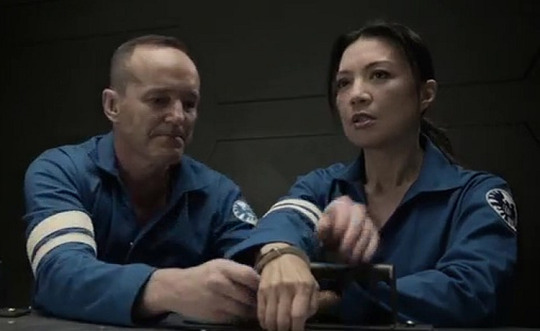
In episode 6 of season 7, Agents of SHIELD continues to celebrate July 4, 1976 in the Lighthouse. Coulson and May are interrogated by Rick Stoner while the Chronicoms quietly steal the faces and personalities of SHIELD agents. Mack and Elena break his parents out of the cell Hydra and the Chronicoms have locked them in. Deke discovers that Nana Jemma has become a cyborg. Enoch helps Nana Jemma with her malfunctioning cybernetic implant, Diana, which helps her stop thinking about her missing husband, Bobo Fitz.

I need one of those implants. This is a fun season, but I miss Fitz. What if they can’t get back to him at the end of this adventure? Will he be lost in time and space FOREVER? Isn’t the real world bad enough without making us worry that FitzSimmons won’t find their way back together??? #BringFitzHome
Recap
We begin inside the synapses that make up the strands Sibyl manipulates between her hands when she acts as an oracle, which is just super cool. She speaks of the patterns followed by all of life, from oceans to leaves, then asks Luke if he can sense the living energy of the new world he now stands on.
I admire her optimism that’s he’s more than a soulless machine.
He’s soulless, but has the overdramatic streak typical of Chronicoms. He tells her all he feels is the death of their hopes and dreams because she failed them miserably with her bad predictions and now she’s allowed SHIELD to bring down Project Insight.
Truly, there is nothing better than a poetic but restrained soulless monster. Luke is beginning to come into his own. The Chronicoms have developed into a delightful race of Data-Spock style extremely understated over emoters, lost children forever searching the universe for the place where they truly belong. I still think the war would end immediately if each Chronicom were assigned a human best friend.
Luke is sad about Freddy’s death, too, which is sweet. Sibyl is patient with him, trying to reassure him that she sees 10 steps ahead, plus all that other stuff from Freddy’s villain monologue last episode. Luke has read the Predictor pamphlet and thinks he knows the truth.
Sibyl helps him see more clearly, reminding him that Daisy and Sousa have been captured by Nathaniel Malick, Shield was forced to reveal their location and Mack will come to the Lighthouse to retrieve his parents.
The Shield team is under pressure and separated. They will make fatal mistakes soon.Sibyl instructs Luke to begin the next phase of their plan. They must continue to adapt.
He leaves his virtual reality session with her. We see him remove his hands from 2 ports in the Chronicom time ship, then activate the wake cycle for several hunters. There are dozens of Chronicoms in storage in this room of the ship.
In the Lighthouse Command Center, Stoner’s agents discover that Insight is down. Stoner orders them to find the ship that took it out. May and Coulson are brought to him as prisoners. Coulson tries again to convince Stoner that alien robots are responsible for Insight, so it needed to be stopped.
Stoner still can’t see himself as the villain in a space age Bond conspiracy. He blames Chastity for the loss of the steak he’s using to stop the swelling in the eye she punched in episode 5.
May is forced to admit that Chastity McBride isn’t her real name, which is just a sad, sad time for all of us.
I wanted Patrick Warburton to say her full alias, with relish, everytime he spoke to her, all episode. Or all season. May could reveal her true name at the end of the episode (or season), when she tells him her rank.
Then my fan fiction begins and it’s a private session, so none of you are invited. Sorry.
In the meantime, we discover the Chronicoms gave SHIELD some futuristic space tracking tech which allows them to track the Zephyr now that it’s revealed its location once. SHIELD’s goose is cooked! So far, no one has made a move against them, even though they haven’t recloaked because the quinjet was docking, but it’s only a matter of time.
Jemma orders Enoch, who’s in the pilot’s seat, to recloak, then turns to Deke and Elena. She’s surprised they didn’t bring Malick back with them. Elena tries to cover for Deke, but he admits straight out that he shot Malick dead. Mack is on his way to rescue his parents and not okay with the idea of murder. He won’t even pause for a quick debriefing of the mission, which is part of his role as director.
Elena would have brought nuance to the story, had she told it to Mack.
He decides that there’s no possibility of extenuating circumstances and grounds Deke in the Zephyr. Mack ignores the fact that Deke knows the Lighthouse best, which makes him a good choice for this mission. In Mack’s mind, Freddy had 2 sons who just lost their father, thanks to Deke’s impulsiveness. He’s worried the Chronicoms may become impulsive with his parents, too.
Mack is also probably flashing back to everything he never liked about Fitz’s moral judgements. Fitz always threw tough moral decisions into stark relief for Mack and highlighted the complexities, which Mack wanted to ignore in favor of harsh black and white lines. Fitz would come down on the side of the greater good for a very inclusive all, no matter the personal cost to a few individuals, while Mack would come down on the side of humans and the least violence toward them first, no matter the outside cost.
With Jemma being the one exception. Fitz would let the world end rather than let her be hurt.
Deke is a pragmatist who chooses the method that will work best in a particular situation, but his talents are in analysis and adaptation, so his mind is open and scanning for the best solution among the available options. Like his grandparents, he’s not judgemental about who he saves or cares about. He judges “people” as individuals.
Now Mack is going into a base filled with SHIELD agents and Chronicoms who will both see him as the enemy and who he might not be able to tell apart. Mack is fine with killing robots and non humans (according to his own fluctuating definition of who is human and who isn’t), but doesn’t like to kill humans ever and hates collateral damage.
This mission is a nightmare for him, one which he’s taking out on Deke.
Elena brings up that the Chronicoms are using Mack’s parents as bait to lure him to the Lighthouse. She’s not going to let him go in alone.
Before he leaves, Mack asks about Daisy and Sousa, but Jemma hasn’t heard from them. He tells her to scan for them and for the enemy ship. He wants to bring the pain to the Chronicoms for once.
On the way to the Lighthouse, Mack worries about the rescue op and recounts memories of spending the Bicentennial with his family as a kid. He didn’t think this is how he’d introduce Elena to his parents. She says that she’ll make a heroic first impression with them. But she also says that the Chronicoms are purposely messing with his head and he needs to stop letting them.
Back in the Lighthouse, a Chronicom with a sense of humor has initiated the lockdown protocol. The Rick Stoner projection is giving safety tips all over the facility. The real life Stoner is annoyed by himself, but the Chronicoms have seized control of several systems so the projection can’t be turned off.
This is a nod back to our first encounters in the Lighthouse, when Enoch and Noah had been using it as their home base and storage facility. Though SHIELD built the Lighthouse, the Chronicoms have always known more about it than anyone, other than maybe Robin and Deke.
I’d love a visit from teenage Robin before the end of the series. She could be their oracular secret weapon.
The weapons systems have also been hijacked, while the radar has picked up the Zephyr. Coulson tells Stoner it’s the Chronicoms, but Stoner is NOT IN THE MOOD FOR SASS from prisoners ON AMERICA’S BIRTHDAY. He forbids weapons fire, but they do anyway. The Zephyr is hit.
Daisy, who was hit by an icer fired by Nathaniel Malick in episode 5, is just now waking up. She and Sousa are drugged, shackled and on the floor in a barn. When she discovers she can’t quake, thanks to the drug in her system, she calls Nathaniel Malick’s Little Psycho. He walks in at just that moment.
He reintroduces himself and makes it clear that he’s only tangentially Hydra. Nathaniel doesn’t care about the crime syndicate or squid worship sides of the evil organization. We saw this the first time through the timeline in S3, when Gideon offed his brother by rigging the Heads of Hydra pebble system that determined who was sent to Maveth to be sacrificed to Hive.
This time around, Freddy kept Nathaniel alive long enough for him to discover an interest in the inhumans’ superpowers. He wants to transfer Daisy’s powers to himself. Which actually makes Nathaniel’s first fate a good fit, too, when you think about it. As part of Hive, he also became an inhuman, in a sense.
When Sousa speaks up, Nathaniel tells him that he’s the most well-preserved 60-something Nathaniel has ever seen. He assumes Sousa is also an inhuman, since he appears to be aging so slowly, and says it won’t go well for Daniel if he doesn’t have super powers.
Nathaniel explains to them that he’s not holding them for a ransom. He plans to experiment on them, with Daniel Whitehall’s help. He loves Daisy’s whole vibe and nothing she or Daniel say threatens him. He’d love to see a demonstration of her powers, but the drugs are still in her system. He orders his goons to take her to his lab.
Stoner takes Coulson and May to an interrogation room, where their handcuffs are locked to a table. Stoner pretends to listen to Coulson when he describes the face-stealing Chronicoms for the 3rd time, but when May joins the discussion, he makes it clear he still isn’t taking them seriously.
He does say “Chastity McBride” again, though.
A junior agent brings Stoner a message. She walks over behind Coulson and May, giving a threatening speech, then tells Stoner he’s needed in the basement. She puts her hand on May’s shoulder. Stoner tells them that Malick is dead, then leaves with the junior agent.
Once he’s gone, May tells Coulson that the junior agent was emotionally dead. She was a Chronicom.
Jemma, Deke and Enoch put out the fire on the Zephyr, but then Enoch notices that the exterior cables which control the time shielding and allow the ship to jump through time safely have been damaged. If the ship jumps through time without the shielding, parts of the ship will be left behind and crushed. Since they could jump at any time, they need to fix it immediately.
Except Jemma stumbles when it comes to giving exact instructions for how to fix the shielding. She sends Deke off to look at the power regulator, while she and Enoch look at the control panel. But she can’t remember what to do once they’ve opened the panel. Enoch tells her it’ll be okay, but he needs to help her now.
Mack and Elena cut a hole in the cell wall to get to his parents. He rushes over and hugs his surprised mom, Lilla, who of course doesn’t recognize him. Elena tries to cover for him, saying he’s just happy that Lilla and his dad, John, are safe now. They introduce themselves, then get moving. Mack’s parents don’t understand why they were chosen as hostages and he doesn’t want to influence the future by telling them. He tells them to take cover if fighting breaks out.
The junior agent tells Stoner that his help is needed on a problem with the mainframe in the basement. As they walk to the elevator, he remarks on how annoying it is that his face is still playing on a loop. She tells him they’ll remove his face in a minute.
Coulson argues that the junior agent, Agent King, can’t be a Chronicom because they saw her display personality. They realize that he can show personality and the Chronicoms are mimicking him. They figured out that they can copy what he does, except he’s not stealing something from a living person.
He goes on to tell May that he doesn’t appreciate her lack of attitude. He would normally turn to her after dying and coming back, but she won’t give him anything, not even her thoughts.
May: “You want to know what I think? You never die. You always come back. You know how many times I’ve mourned you? I’m not doing it again. And I’m certainly not doing it for a decoy with a simulated personality!”
Coulson: “Thank you! There she is. Don’t look now, but your emotions are coming back. Unless you just picked that up from watching me… They’re mimicking me. Adapting.”
May: “Are we done sharing now?”
Coulson breaks free from his shackles with ease, then breaks May’s. He was only staying locked up to be polite.
His says that Luke told him the Chronicoms had ways of adapting. He guesses that they’ve developed a method of stealing memories and personalities, then uploading them into Chronicom bodies, allowing them to infiltrate and take over in much the same way Hydra did.
May realizes Stoner must be next. Downstairs, he’s taken into the room where the Chronicoms keep their face and personality copy machines. They’re making copies as fast as they can.
Mack and Elena lead his parents through the corridors to the quinjet. His dad gets tense and snaps at Mack. Mack has a hard time holding his own temper in check. Mack’s mom explains that they’re worried about what will happen to their sons if they don’t make it home. That brings Mack’s focus back.
They need to get through a heavy, motorized blast door to get to the quinjet, so Mack has his dad, who’s also a mechanic, help him figure out how to get it open without the passcode. They share a family saying, “If you can’t fix one thing, you fix another.”
Stoner is in the personality copier when May and Coulson come to the rescue. One of the Chronicoms gives an order to “Bring another Hunter up for the next conversion.” May and Coulson bring him a fight instead. When they get Stoner out of the machine, he says he now believes them about the alien robots.
They explain the face and personality stealing process to Stoner. He figures out that the faceless bodies on the floor are dead friends and colleagues and that he needs to get the rest of his people out of the Lighthouse.
Coulson tells May to rendezvous with Mack and Elena. He’s going to figure out where the Chronicoms are bringing the Hunters up from. He discovers a hatch in the floor with a ladder inside.
Sousa watches Nathaniel’s experiments through a hole in the wall. When Daisy’s brought back to the barn, Nathaniel says he took as much blood and spinal fluid as Daisy could handle without dying, plus a couple of glands. He’s going to synthesize it all and inject it into himself. If this doesn’t work, he’ll “switch from needles to knives.”
Daisy tries to tell Sousa that the same thing has happened before, with her mother, Jiaying, but he doesn’t understand. He pulls her head onto his lap and tells her the story of his war injury to keep her awake.
He was hit in the fog and knocked out. When he came to, he was alone and his leg was a pulpy mess. Then Mike Stephens, a guy he didn’t like, showed up. Mike stayed with him and kept talking. He carried Sousa back from the front line. As the Germans advanced, Mike kept telling Sousa they were going home. Eventually, Sousa was in a stretcher and Mike wasn’t, implying Mike died to save him.
So Sousa is going to keep Daisy alive as a way of repaying Mike Stephens. He tells her insistently that they’re going home. She struggles to open her hand and show him that she palmed a sharp metal shard. He admires her fighting spirit.
Jiaying is, or was, basically immortal. Daisy is hard to kill, largely because she refuses to give up. But also now she has gravitron in her.
Deke finds Enoch working on Jemma’s head. The scan that he’s using shows something implanted into her spine and brain. Deke thinks quick and uses defibrillator paddles to shock Enoch into unconsciousness. Then he uses smelling salts to wake Jemma up.
She’s not okay with what he did to Enoch.
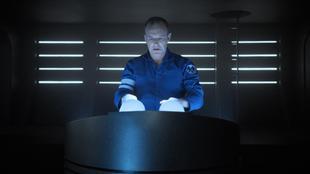
Coulson climbs down the ladder and into the ship full of hibernating Chronicoms. He sticks his hands into Sibyl’s ports and asks if he’s come at a bad time.
It’s never a good time to stick your hands into a woman’s ports uninvited.
Mack and John have to force the door open anyway. John’s arm gets cut while they’re pushing. Mack leaves them to keep working while he fights some Chronicoms.
Coulson chats with Sibyl, who’s surprisingly open. She says she sees no reason not to answer the questions he’s asking. She tells him that his body is in their time ship, which appears underground. That’s why SHIELD hasn’t been able to find it.
His mind is in her virtual space. She says they call her the predictor, but she simply reads the time streams. Coulson asks if she sees the future.
Sibyl: “I see the past. As written by a single future. A tree grown, but also the many trees it could have grown to be.”
They have the usual semantic discussion about whether Coulson is actually a Chronicom or not. How do the Chronicoms define themselves? What is the essential part? Sibyl refers to herself as having a digital mind. Is that what makes her a Chronicom?
We were told in the beginning of the season that Coulson is an LMD enhanced with Chronicom technology. Was that description meant to make Mack (and us) okay with this new version of Coulson, even though it’s a robot? Even though the LMDs were murderous, too?
Jemma rushes to fix the ship while she and Deke argue about whether or not he was justified in saving her from what looked like a creepy robot attack. Jemma tries to get away with saying IT’S FINE AND DEKE OVERREACTED TO THAT THING IN HER BRAIN, which by the way looked like it had a couple of tiny tentacles. But Deke is from the future and even then an implant like that wasn’t okay, especially when it’s being “adjusted” by a robot who’s switched sides multiple times, if we’re being honest. Deke doesn’t buy her excuses and insists on real answers.
It’s about time.
She finally tells him, “He was fixing my memory so we can fix the ship.”
That definitely explains everything.
Deke realizes that she just said she doesn’t know how to fix the time machine that she’s currently working on.
I’ve been wondering when someone would remember that Fitz is the engineer, not her. Though I’m sure she’s picked up a fair amount of engineering, the same way she picked up several alien languages in S6, it doesn’t change the fact that engineering is Fitz’s gift and they kept their science disciplines separate for a reason. He’s the one who invented the time machine in S5. I doubt that changed in this timeline.
Jemma: “You cannot imagine how impossible it was to track the Chronicoms through time. But Fitz and I found a place where all their moves could be observed. And to guide us, Fitz stayed there. He is completely exposed and they will kill him if they find him, so no one can know his location.”
But Jemma knows, so she designed a biological implant to suppress her memories, named Diana. They’re inseparable. But the implant is malfunctioning and she’s forgetting and remembering the wrong things, so Enoch was helping her with it.
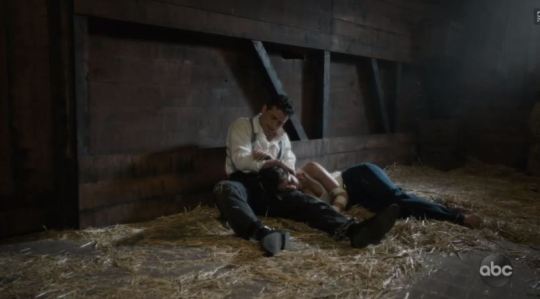
Nathaniel’s goons come into the barn and uncuff Sousa’s ankles. Sousa attacks, using the metal shard as a weapon. He knocks the guard out, then unlocks his own and Daisy’s cuffs. She’s still unconscious, so he picks her up to carry her out. As they’re leaving, Nathaniel enters the room. He has Daisy’s powers and is causing an earthquake, but his bones are also fracturing. The barn collapses on top of Nathaniel as they run out.
Sibyl tells Coulson where Daisy is. She says Nathaniel’s chances of successfully stealing her powers are 22%. Daisy has an 86% chance of survival. She says they’re using Mack’s parents to get to Mack and they want Earth to ensure the survival of “my species.”
She tells him that Chronicoms are more valuable than humans because they live so much longer. Human lives are fleeting and they make stupid decisions because of it. Within a stable environment, Chronicoms can live forever. If necessary, they’ll wait the humans out.
Coulson tells Sibyl she’s wrong about 3 things. The first two are the human capacity for sacrifice and tenacity. The third is him. Dying is his superpower.
He pulls his hands out of the ports, then sends a brief goodbye to May. He blows up the time ship with bag of explosives that was originally meant to flood the Lighthouse, blowing up himself along with it.
Mack has been fighting Chronicoms all this time. The explosion lifts the lockdown, so the door to the quinjet opens. Luke is about to shoot Mack when May and Stoner show up and shoot Luke instead. Stoner walks them all to their ride.
He and May say goodbye. He offers to buy her a drink, now that he’s pretty sure she doesn’t work at the Lighthouse and isn’t under his direct command. She tells him she’s Level 7, which means she’s his superior officer, and gives him orders to clean up and cover up the operation.
Once everyone is in the quinjet, May tells the others that Coulson is gone, but he’ll come back, just like always.
Once Enoch has been revived, he finishes his work on Jemma. While he helps her, Deke give him a Jemma-approved apology.
Deke: “Enoch, I’m sorry about before. I didn’t realize that things were so dire… And you are a valued member of our family.”
Enoch: “That is the greatest compliment one could be paid. Apology accepted.”
When Enoch is done, Jemma’s memories and forgetfulness are back in place. She asks Deke to keep her secret.
Mack brings his father to the quinjet cockpit to tell him about the tech, while Elena and Lilla bond in the back. John touches May’s shoulder to thank her for her part in saving him and his wife.
Oops, rookie Chronicom mistake. May felt no emotion, so she sets the quinjet to circle and tells Mack to check the cut on John’s arm. At first, he refuses to show them.
When he does, it proves he’s a robot. Mack fights John while May fights Lilla. Fake John says that they killed Mack’s parents a while ago. Eventually, Mack has to kill both of his “parents” and push them out of the back of the quinjet. He has to listen to his mother beg him as he pushes her to her “death”.
Geez, this show loves to torture him. That was horrible. I was already still haunted by Hope disappearing in the Framework.
Not gonna lie, I’m still tempted to lobby for them to print out some of those Framework residents. They could be LMDs, like Coulson. Hope could get a new, slightly bigger, LMD body on her birthday every year.
My kid is a cyborg who gets a new insulin pump every few years. It’s not too many steps removed.
Sousa and Daisy make it back to the Zephyr. Jemma puts Daisy in the healing chamber. Sousa stays on the ship.
They jump without incident.
Mack gets on a motorcycle and takes off.
In the tag, Mack is sitting in a field of flowers a little ways from the Zephyr, facing away from the ship. Deke walks toward him to check on him. Jemma frantically calls Deke back to the ship- they’re about to jump. Mack doesn’t respond when Deke yells to him.
The Zephyr leaves without them.
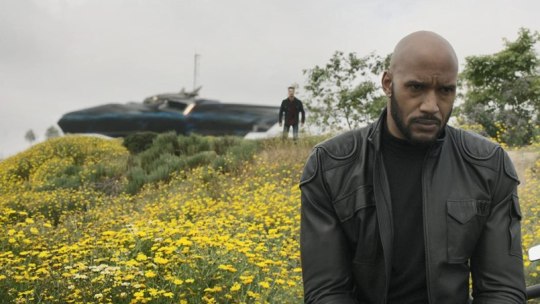
This slideshow requires JavaScript.
Commentary
In hindsight, blowing up the ship that had the Chronicoms’ time drive in it might not have been the best idea, since the Zephyr is tied to it. Who knows what this will do to their jump cycles?
OMG, I thought Henry Simmons (Mack) was about 35 and way too young to remember the Bicentennial. He’s 50 years old! Good on him. This cast never ages.
Rick Stoner really, really deserved to be rescued from the 70s and brought onto the modern SHIELD team. I will believe this until my dying day. He has essential qualities as an agent that would have saved the world many times faster than it will ever be saved without him, like having the foresight to build the Lighthouse and having a voice that makes every order sound crucial. The future Kree wouldn’t stand a chance against his manly tones when they tried to get all sinister.
Since human Coulson is gone, I’m going to assume that eventually May will find a way to get back to Stoner and live out her life with him, using the alias Chastity McBride. No matter how the series ends, this will come true in some happy timeline, somewhere. Time God Fitz will make it so.
Human Coulson will spend eternity in heaven with his violinist. Cellist?
LMD Coulson should get Sibyl to change sides to be with him, because she definitely has a thing for him. She has Luke ask him if he likes her-likes her and wants to be her boyfriend in, like, every time period.
This episode, she let him get to second base with her and her blew up her ship, so it might get ugly between them for a couple of episodes. I know true love when I see it though and it would be a shame to let this relationship die.
Timestreams and Predictions and Fitz and Mack
Sibyl: “I see the past. As written by a single future. A tree grown, but also the many trees it could have grown to be.”
Jemma: “You cannot imagine how impossible it was to track the Chronicoms through time. But Fitz and I found a place where all their moves could be observed. And to guide us, Fitz stayed there. He is completely exposed and they will kill him if they find him, so no one can know his location.”
There is a reason we were shown these two speeches one after the other.
This sounds to me like Fitz could be in the place Sibyl uses to read a single mind. Like maybe it was a honeypot trap and FitzSimmons fell into it. Why else would there be a place where Fitz can magically see everything the Chronicoms do, if it’s not also the place that the Chronicoms use for their predictions?
I just hope Fitz isn’t a disembodied brain now.
I think Deke is right to be suspicious of Jemma’s implant. I can’t guess which side Enoch is on, since he switched a few times in S6, but I wonder if Fitz is dead or trapped or a hostage and she won’t let herself remember it. Sibyl could be using the exceptionally detailed scan of Fitz’s brain that was taken when they scanned him and Jenna in S6. Or they could have scanned him a second time after the season ended.
Enoch did show up out of the blue at the end of S6 with a risky proposal for Fitz and Jemma. That could mean he’s really working for the other side. It wouldn’t make much sense, but maybe this is the only way the Chronicoms win without heavy casualties.
Nathaniel made that speech to Daniel and Daisy, telling them that they weren’t technically hostages, because he didn’t want to exchange them for anything. Could that be Fitz’s situation- he’s not a hostage because they have no intention of ever letting him go?
Coulson made a lot of mistakes when he interrogated Sibyl. He finished her sentences for her, rather than letting her talk. He made too many assumptions. It was really her interrogating him. LMD Coulson has the original’s memories, but not the instincts the man gained from experience. This Coulson still has to accrue his own experiences.
But anyway, I noticed that Sibyl told Coulson that she wants Mack. I wonder if that’s the truth.
The simplest answer to what she meant is that they were hoping that Mack’s Chronicom parents could turn him into a Chronicom. Since he’s the director of SHIELD, the rest of SHIELD would fall soon after. They could have turned May and Elena when they turned Mack.
But it seems like Enoch would be trying to lure them all into personality copiers if it’s all they wanted.
Mack is the team member who’s held onto his humanity the hardest and is often the moral compass of the group. But he’s not always honest and he’s been a traitor, though the show would often like us to forget that.
Then again, they specifically included Robert Gonzales’ name on the Project Insight list last week. Gonzales was the man Mack and Bobbi followed when SHIELD split into 2 warring factions (besides Hydra) in season 2. Gonzales knew that Fury had chosen Coulson as his successor and disagreed with the choice because he felt it was wrong for SHIELD to be led by a man with alien DNA. (After being resurrected using the TAHITI protocol, Coulson had Kree DNA in his system, just like the inhumans.)
For a long time, Coulson didn’t even know the 2nd SHIELD faction existed. Mack and Bobbi joined Coulson’s SHIELD as spies. It took Mack a long time to trust anyone who had anything to do with either alien DNA or robots.
It could be the Chronicoms want to continue to exploit that old weakness of Mack’s. It could also be that they know about the death of his daughter, Hope, and the way it affected him both in reality and in the Framework. They might want to use it to push him past the breaking point.
If the Chronicoms have access to Fitz’s mind and the different potentials for it, they could see the way the other Fitz cracked under too much pressure, after too much dehumanization. Might they be trying to push Mack into that same type of breakdown? Making him murder his mother the way that they did felt like turning him into everything he hates, while also twisting his mind, since his fake mother was also a robot. It seemed like it was meant to start confusing him about who was real and who was fake.
Each episode this season has been patterned after a particular movie genre. Since Mack is the movie buff on the team and is the director of SHIELD, I’ve wondered if it’s a way to say that we’re seeing the show through his eyes.
But now I wonder if the Chronicoms also know that he’s a movie lover and are specifically playing to film tropes. Maybe they want him to feel the gangster films turning into 50s B movies, which become slightly more suspenseful 70s Bond and political thriller films. As Deke pointed out, horror movie tropes are sneaking in, such as the spoofed line from Terminator 2 and the body snatching.
But there’s another aspect to what we’ve seen all season. If the Chronicoms are watching the team through Fitz’s eyes and using what they see to devise a strategy to take the team down, it could be that Fitz is purposely directing what they see in order to mislead them.
Movie themes play to Mack’s strengths because they follow tropes and scenarios he’s worked with before. They have clear good guys and bad guys. By literally dressing the Chronicoms up as stock characters from the entertainment of the team’s past, they’ve been cut down to size and made a manageable enemy with clear goals and motives.
I don’t think we’ve been given all of the information yet, so we can’t fully understand what’s happening. But it feels like the Chronicom’s strategy is aimed at bringing down Mack, with a side of hoping to turn Coulson, one of the most loyal people around.
The Chronicoms may be using a divide and conquer strategy based on the way the team fell apart at the end of S5. It was Mack who stepped in as Director when Coulson’s health failed and SHIELD was a shambles. The Chronicoms must figure they can divide and conquer the team for good this time.
But this isn’t the same team. Coulson is a younger, more optimistic LMD. Fitz isn’t there to butt heads with Mack. Mack and Elena are on the same page. May and Daisy aren’t desperate to save Coulson. Or maybe that was why Sibyl set him up for the suicide mission in the time ship.
But it won’t work this time. May doesn’t have the same feelings toward the LMD that she had toward the man and and Daisy is distracted by Sousa.
Most importantly, Deke has stepped up as a member of the team. They may not fully accept him, but he’s chosen them. He’s lived through much worse than any of this and he’s not going back. He believes in the power of positive thinking and is loyal to a fault. He’s filling in some of the gaps in the team dynamic left by OG Coulson and Fitz, including quietly watching out for everyone’s safety and mental health.
As a character, he frequently suffers from the Cassandra Complex issue of seeing the problem before anyone else will believe it exists, but he doesn’t let it stop him. Geniuses are used to being ahead of their time.
Images courtesy of ABC.
#AgentsofSHIELD S7Ep6: Adapt or Die Recap-Stoner questions Coulson & May while Chronicoms snatch bodies in the basement. Mack & Elena break his parents out of the Lighthouse. Deke finds that Nana Jemma has a suspicious brain implant. In episode 6 of season 7, Agents of SHIELD continues to celebrate July 4, 1976 in the Lighthouse.
#Adapt or Die#Agents of SHIELD#clark gregg#Elizabeth Henstridge#Henry Simmons#marvel cinematic universe#Marvel Comics#metacrone#ming-na wen#Natalia Cordova-Buckley#science fiction#Time Travel
0 notes
Text
The Magnus Archives ‘Hard Shoulder’ (S02E21) Analysis
It’s the return of Section 31, and a bit of follow-up on one of the few largely standalone stories from the series. Is everything connected? Who are the drivers of Breekon and Hope? And … are we ever going to get any sort of emotional payoff for last week’s revelations? Come on in to hear what I thought about ‘Hard Shoulder’.
Okay, going to get this right out in the open. This one didn’t click with me. At all. I found Daisy’s reasons for visiting the archives to be suspicious at best, and potentially utterly nonsensical. Her statement was vaguely interesting, but her character was a total blank for me, and the whole Section 31 plot is definitely the least interesting of the subplots to me. So if you adored this episode and want to give this analysis a miss, I wouldn’t blame you in the least.
Let’s start with the initial revelation, which I both like and I don’t: Basira only helped Sims because she thought he’d murdered Gertrude and wanted to … I really don’t know. Do some sort of undercover sting operation? I mean, that does make better sense than her showing up conveniently with tapes, claiming that somehow the police couldn’t find a tape deck. And frankly, it makes her a better professional, who actually did trust her partner, and used Sims to try to either solve the case or reveal himself as the killer. I like that bit a lot, actually.
What I like less is the explanation for why he’s going to keep getting tapes: because she likes him. Um, sorry, what? She’s willing to break protocol for a guy who’s been mentally unstable the entire time she’s known him, who she thought was a murderer? I don’t care if he was as smooth as Tim, I can’t believe that she would share evidence in a case with a potential suspect just because she liked him. That she would share information because he might have unique insight, or because she was being stonewalled by both her department and the Institute? That I could buy. But this explanation skirts dangerously close to ‘shoehorned love-interest’ territory. I really hope that what’s actually happening is some clever subversion of that, because I would really hate the only super professional female character recurring in this show to be violating professional conduct because she likes someone.
Of course, I must acknowledge that this information is coming from Daisy, who seems shady as shit. She comes to the Institute to bring a tape of her own, for no reason. She doesn’t send Basira, but comes herself. She then proceeds to blow their entire undercover operation by telling Sims about it, and then when he asks her to give a statement, she just … does. Just like that. Nothing in this setup makes any sense to me.
The story itself was fine. It didn’t raise any hairs, but I did appreciate it being a follow-up to ‘Do Not Open’, and perhaps even tying that story in with a few others. Out of everything that happened in this episode, I think the actual story of it worked the best.
For one, the driver of the van was named ‘Tom’, a man with the sort of face so ordinary you couldn’t remember it? The sort that might look an awful lot like a stock photo? I do have to wonder if Not-Sasha’s new boyfriend is also a driver for Breekon and Hope. And if that’s the case, how does he fit in? We’ve only ever heard about the two big fake-Cockney guys.
Speaking of Breekon and Hope, I also appreciated that we got a more physical description of them. Hitting them is like hitting a wall, and their skin is like rubber. Whatever they are, I really don’t think they’re human. They pass for human, and probably work for both human and horrific elements of this world, but perhaps they properly belong to neither.
We also get to find out what exactly was in that coffin from ‘Do Not Open’, or at least we sort of find out. It turns out that the coffin contains a staircase descending into impossible depths. It’s likely this is where John from ‘Do Not Open’ went, and Daisy’s partner followed suit, walking calmly down the staircase as though he was sleepwalking.
So, yeah. The story was fine. We got some potentially interesting information about Breekon and Hope, and about Tom. I think that this is one of two potentially really interesting things to come out of the episode. The other was the only reason I can think of to explain why Daisy would suddenly decide to tell such a personal story—something she’d never told anyone—completely out of the blue. A few people have speculated that perhaps the Archivist can detect lies. I wonder if it can compel statements. It was a little difficult to tell with the voice performance, but I think that Daisy was genuinely surprised and upset she told the story after she was done, and she was completely ready to leave, but when Sims asked about vampires she immediately info-dumped again. To this complete stranger, despite being a hardened cop. The only explanation I can think of why this would happen that remains consistent with that characterization is if she didn’t intend to tell it until prompted, and then had to tell.
That, to me, could be very interesting. Not only could it be interesting for Sims, but it might have fascinating implications regarding Gertrude. Sims is flailing around in the dark as far as what being the Archivist means, but Gertrude had 50 years to master it. What could she do by the end? What if she started using her ability not to passively record, but to hunt and to interrogate?
I’m interested to hear what’s on next week’s tape, delivered by Daisy for an unknown reason. Because to me, the only way I can square the complete not-explanation for her appearance, her revelation about Basira, and everything she did in this episode (except perhaps the statement itself, and its potential coercion), is that it’s a trap. She gave Sims a tape that is going to contain answers, but more than that, will actually harm him. At that point, I think I could forgive a lot of what seem right now to be glaring flaws in this episode.
I guess I should dig into those flaws, shouldn’t I? I’ve tried to put it off, and dig into the few implications I found genuinely interesting, but in truth, I thought this episode was really frustrating. While Basira’s all-too-convenient appearance earlier is now explained, Daisy’s appearance isn’t. If she’s setting Sims up for a trap, awesome, but why blow their investigation to him? Why the explanation about Basira? It doesn’t serve to help Basira in any way, and sort of comes straight out and says that she’s breaking procedure for a stupid reason, making her look unprofessional.
And if Daisy’s statement was compelled, why wasn’t she more shaken? Why wasn’t she pissed that she’d told a very personal story against her will? The only other explanations are that she just randomly decided to tell a very private story to a complete stranger, or that she intended to tell it all along. And neither of those actions make any logical sense whatsoever.
I will put my hand up to not being overly excited about this episode in the first place. The first Section 31 episode didn’t grab me at all, and the entire subplot has left me unmoved. I find conspiracies dull, and have yet to find either Basira or Daisy particularly compelling characters. I was hoping this was going to be an interesting twist in Basira’s story, and with the opening, I felt like we were getting somewhere. Her working undercover, as I said, actually worked really well for me, but that got ruined with the whole ‘she likes you, so she’ll break with procedure to pass you tapes and risk getting fired’ thing which immediately made her look incompetent.
The plot, and the motivations of everyone involved, were entirely opaque. Normally I love a bit of vaguery, since filling in details with your mind is a huge part of what makes audio horror so scary. But this episode was vague for no reason I could discern, and wasn’t even frightening.
I don’t want to be Debbie Downer here. I hate listening to an episode and finding it uninteresting and confusing. I felt like there were two elements to this story that could potentially blossom into something very cool indeed, but I couldn’t make any connection to the characters or the plot. And a connection, after last week’s revelation, was what I really wanted. I may be alone in this feeling, but after some factual closure last week, I wanted genuine emotional fallout. I wanted at least a confrontation with Tim, if not a discussion with Elias or Martin about everything that’s happened. I wanted a focus on the team that’s been put through the ringer this season, and instead we got the sub-plot I find least interesting.
I feel like we’re on the cusp of certain answers and certain revelations, and that this story might have advanced it, but only in the smallest and most tangential way. I was hoping for some hint of character advancement after everything that happened last week, and there wasn’t any. Sims doesn’t seem changed. He’s still doing precisely what he was doing before the CCTV reveal. No one is confronting him, and after all that buildup and what felt like the beginning of payoff last week, I will now admit to a bit of frustration. Even a small acknowledgement that things are shifting would have been something, but this was totally disconnected.
Conclusions
I may look on this episode more favorably later, once certain facts are laid out and better explanations are given. But right now this one is on the list of I’ll-listen-to-it-if-I-have-to-check-lore-and-the-Wiki-fails-me. There aren’t many episodes like that for me, but this one didn’t click. Sigh. You can’t like them all.
16 notes
·
View notes
Text
replies
bamboocounting replied to your post: A meme ask almost prompted me to give this long...
I…CARE…SO MUCH ABOUT NUMENOR NOW
This was of course my WHOLE AGENDA :D
bamboocounting replied to your post: A meme ask almost prompted me to give this long...
by which I mean: what are the quirky civic/municipal ‘rivalries’ that elrond could have gotten up to in memory of elros (I don’t know the timeline of rivendell’s founding vs numenorean history but. just the thought of IN-JOKES CENTURIES OUT OF DATE
djhgfjhs YES Rivendell wasn’t founded until 1200+ years after Elros died and who the hell knows how long it took them to put together any semblance of a library since it was the middle of a war, so like a) YES SILLY ONE-SIDED IN-JOKES but also b)....hahaha Tolkien never really elaborates on how much the people of Arnor visited Rivendell in those early days right after they came to ME either! Maybe it was a lot! Help...
thelioninmybed replied to your post: A meme ask almost prompted me to give this long tangential answer, but...
fuuuuck this is so lovely! So logical! oh god I suddenly have all these warm, fuzzy numenorian feelings
Is it....a weird feeling....
I mean, I kind of...fanwanked myself into caring about Numenor because I felt like its early history and eventual destruction should be something that was like, seriously palpably real in its tragedy and not just academic, and the sheer number of gaping holes in information about it is just, such a fun thing, as a second-best option to having fully-fleshed out actual canon.
isilloth replied to your post: A meme ask almost prompted me to give this long tangential answer, but...”
Is it specifically written somewhere that elves remember everything what they hear exactly the same? And everything from their lifes? I find it very difficult where you are immortal. Did they have time like, stop for hours to find in memory something from they childhood? I think is kind if popular assumption here and I wonder it is canon or headcanon? I know it wasn't main point of this meta, sorry.
Tolkien makes a number of scattered mentions of elvish memory being generally unfading as a result of time, but doesn’t actually say it’s 100% perfect or that they never forget anything. The best kind of, like, analysis of how the persistence of elvish memory is in fact a really meaningful and woldbuilding-significant species trait that separates humans’ and elves’ view of the world and general psychology (and kind of explains how elves’ memory of their own immortality integrates into this, and just like...generally makes both characterization and thematic sense of things) is in the Athrabeth Finrod ah Andreth - it’s both discussed generally and invoked specifically regarding Aegnor and Andreth.
A more dry kind of factual statement about unfading elvish memory is from the Shibboleth of Feanor:
All peace and all strongholds were at last destroyed by Morgoth; but if any wonder how any lore and treasure was preserved from ruin, it may be answered: of the treasure little was preserved, and the loss of things of beauty great and small is incalculable; but the lore of the Eldar did not depend on perishable records, being stored in the vast houses of their minds. When the Eldar made records in written form, even those that to us would seem voluminous, they did only summarise, as it were, for the use of others whose lore was maybe in other fields of knowledge, matters which were kept for ever undimmed in intricate detail in their minds.
10 notes
·
View notes